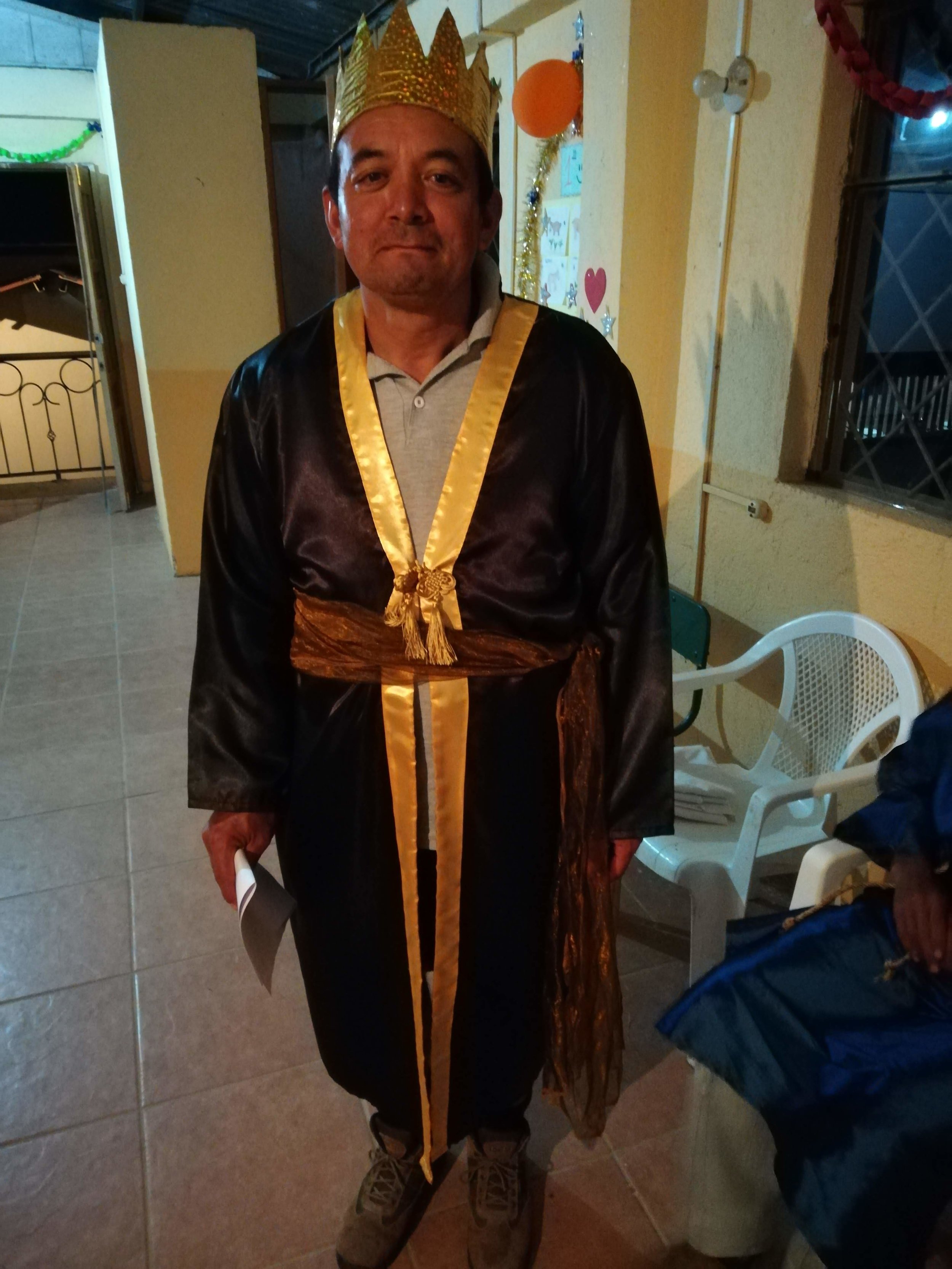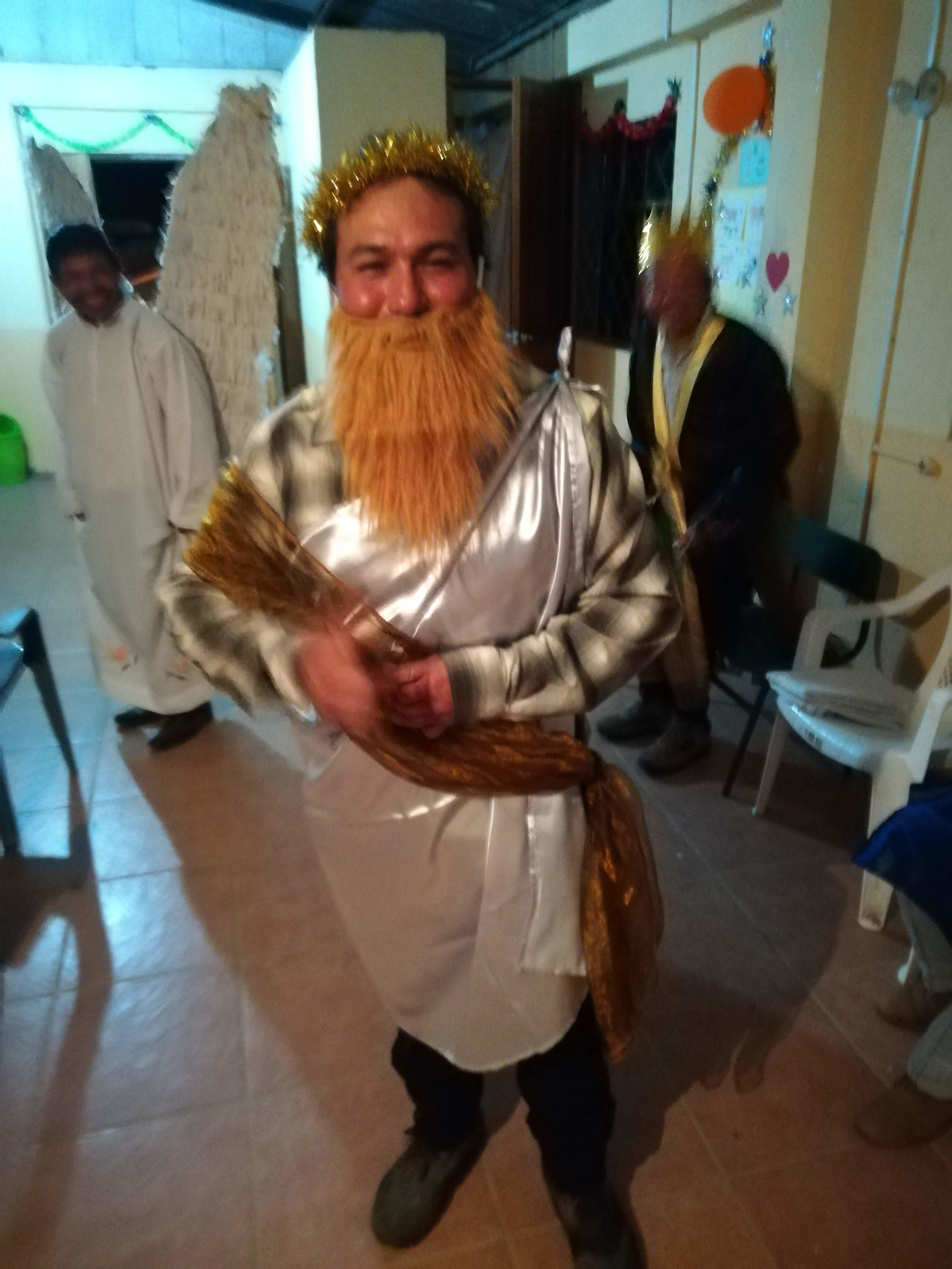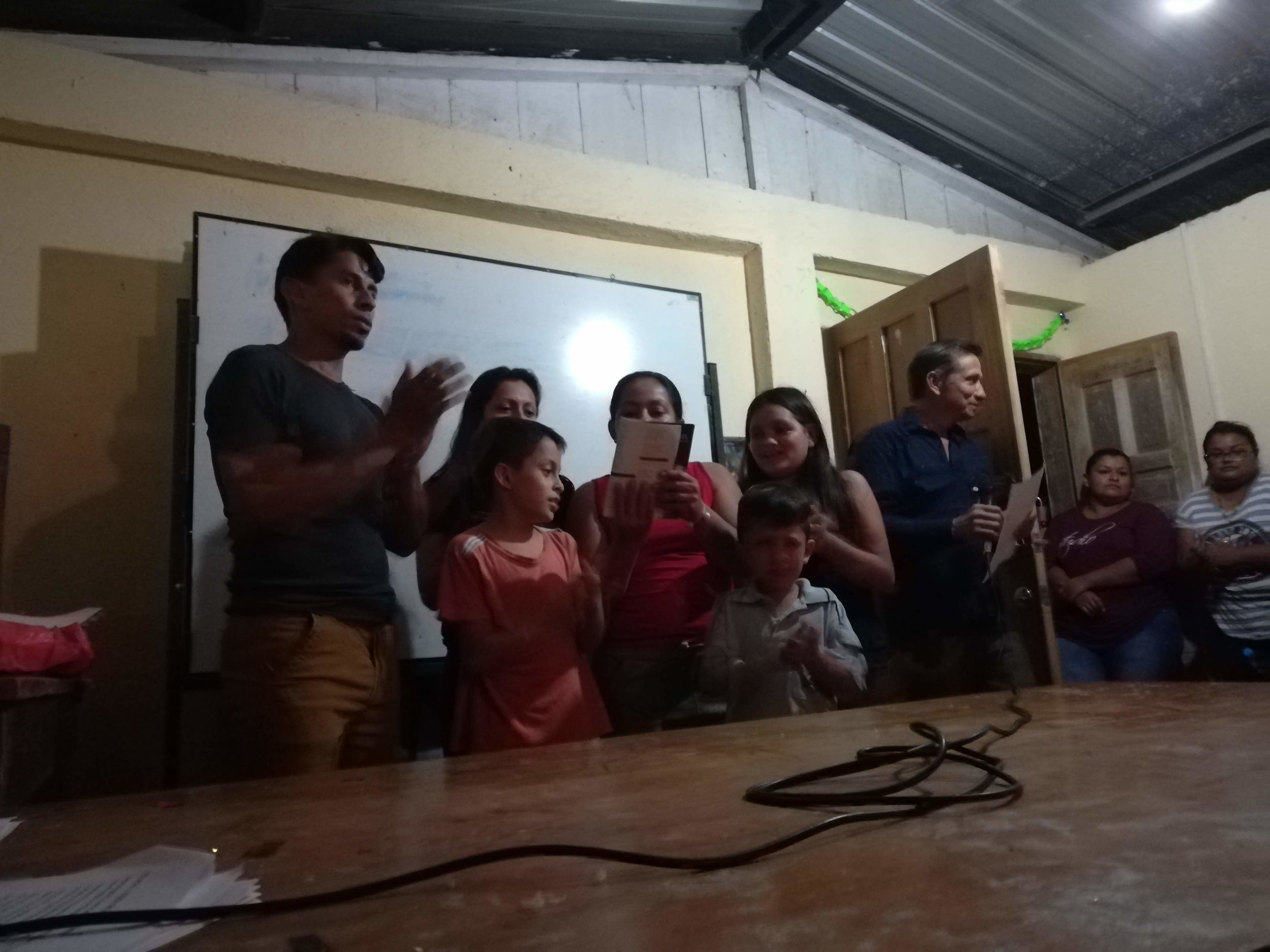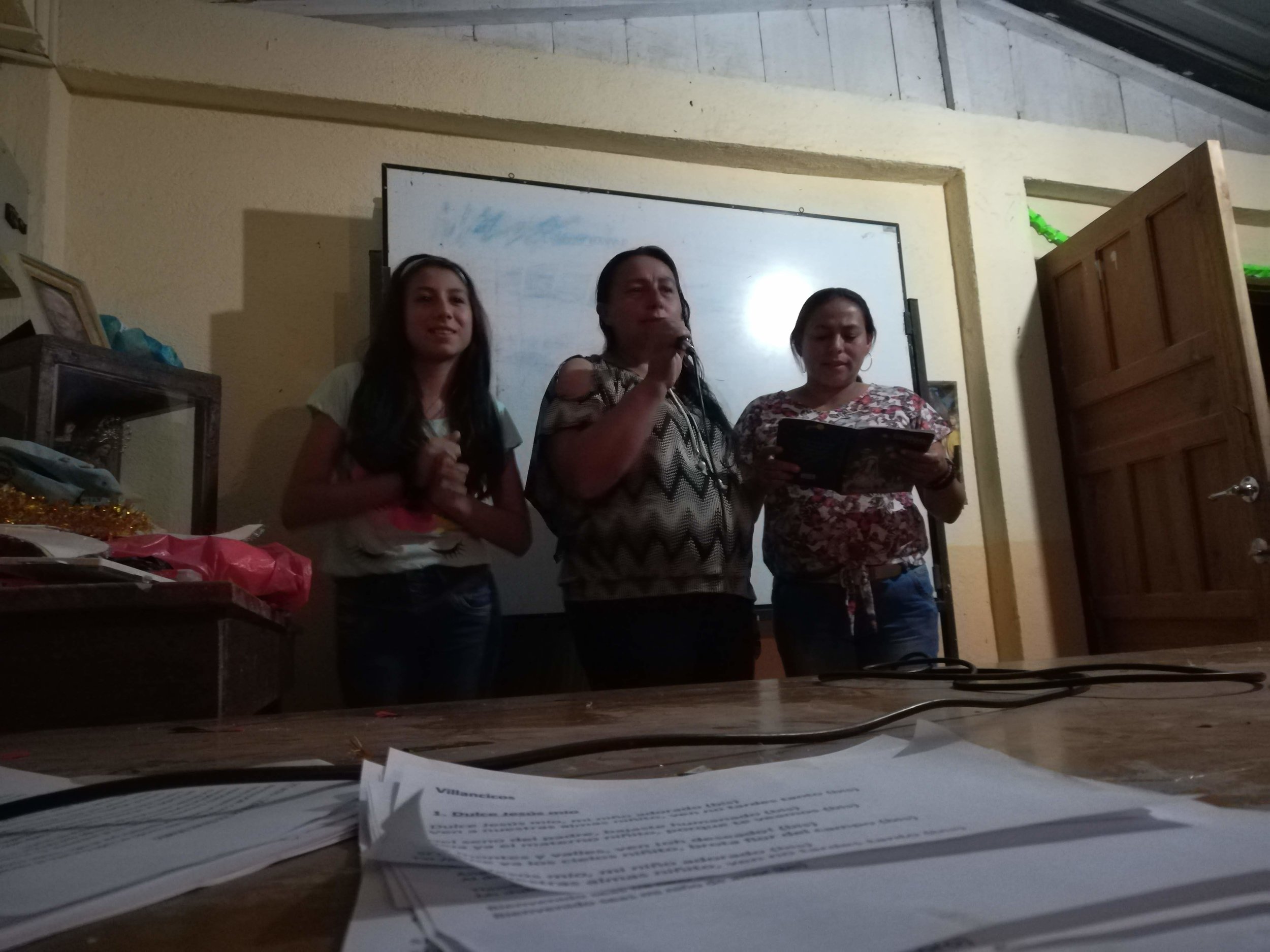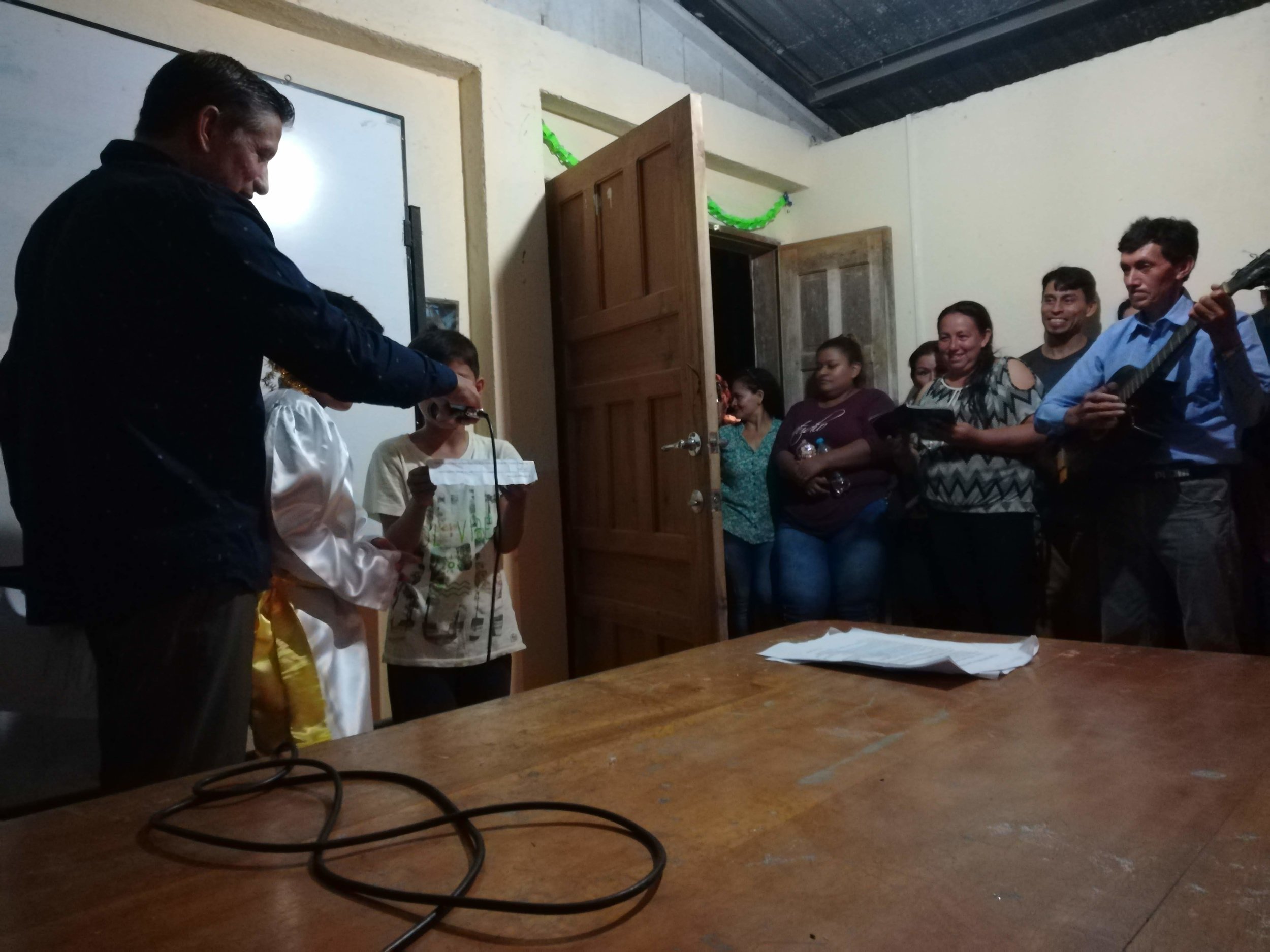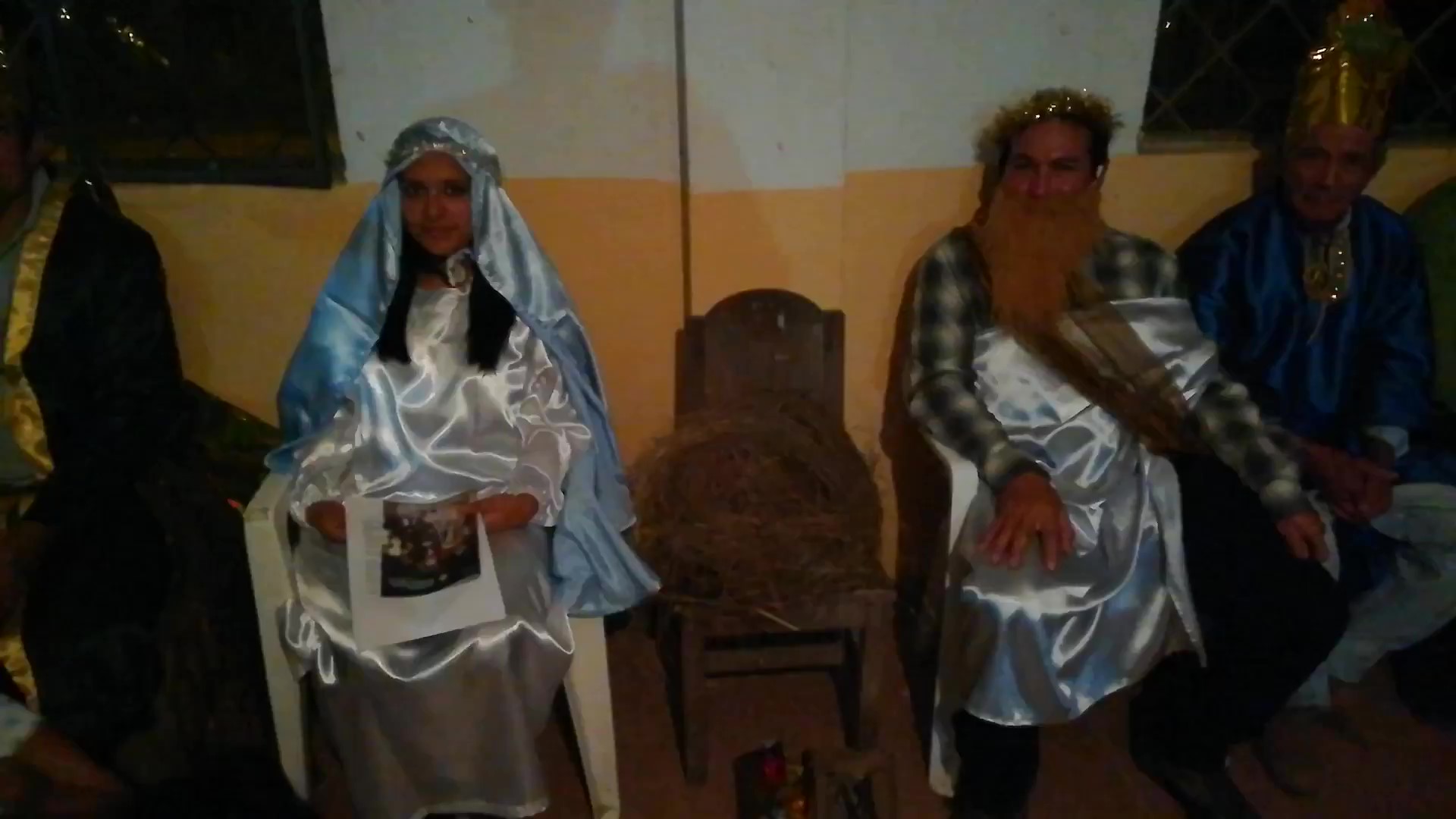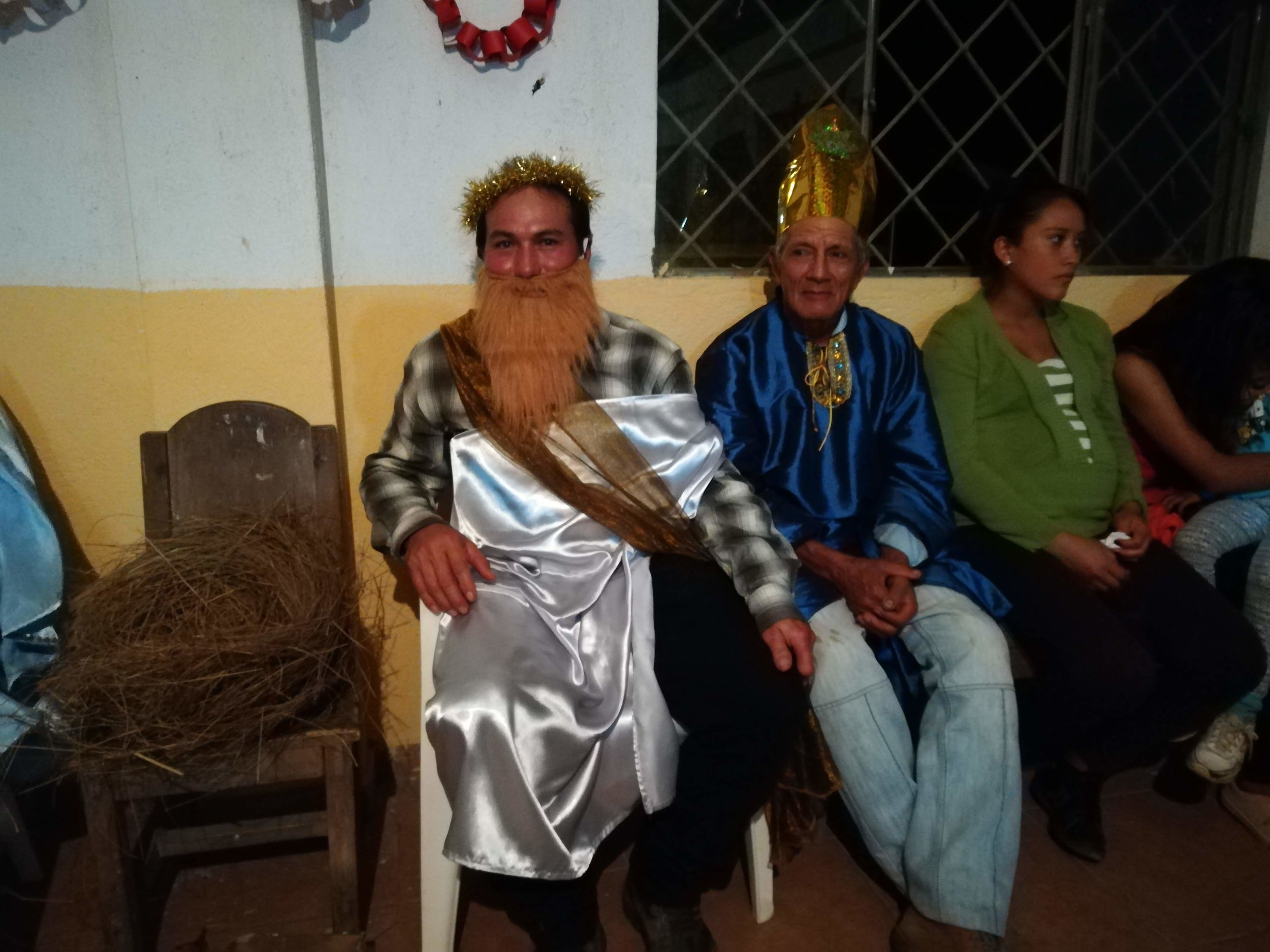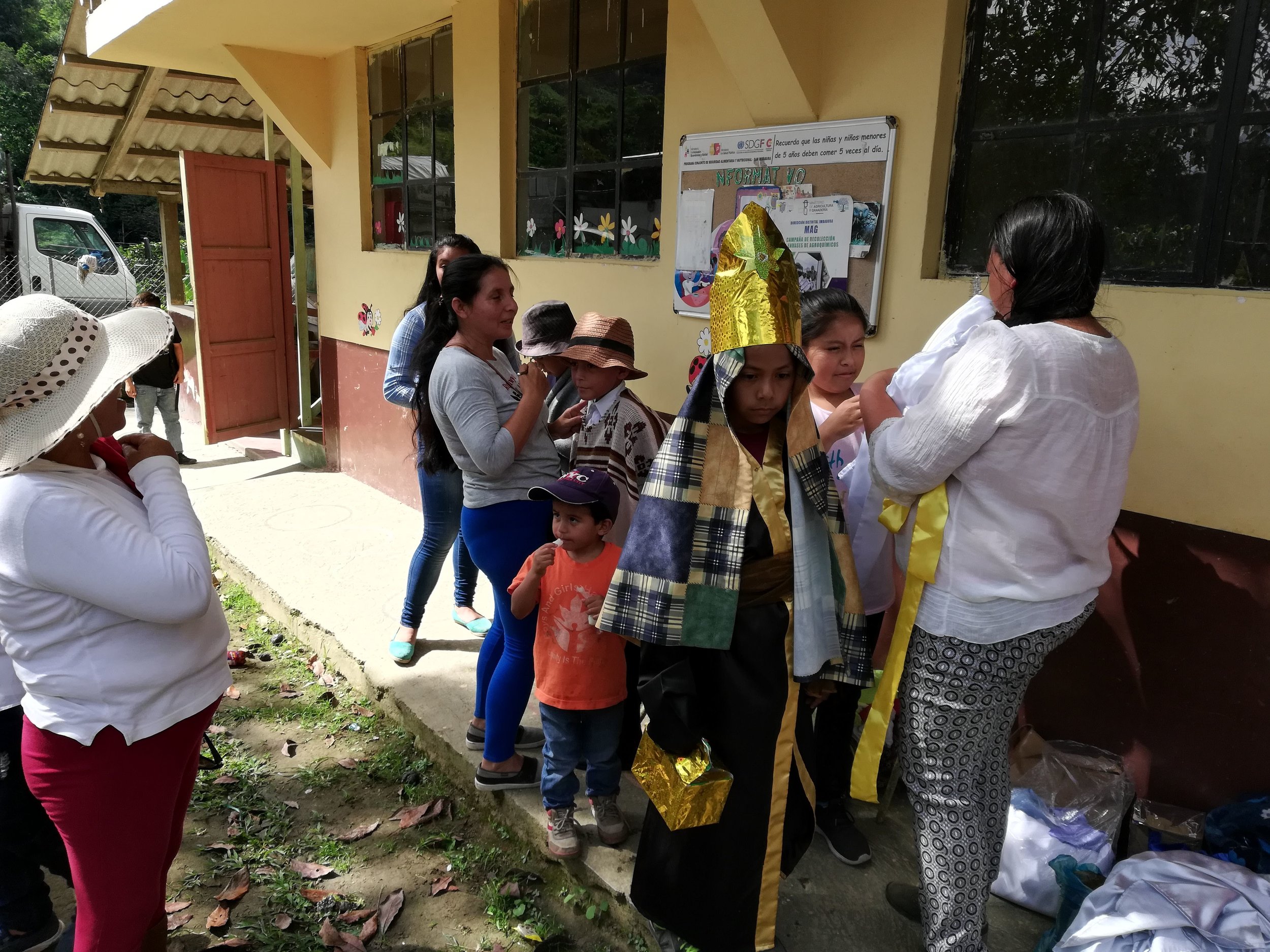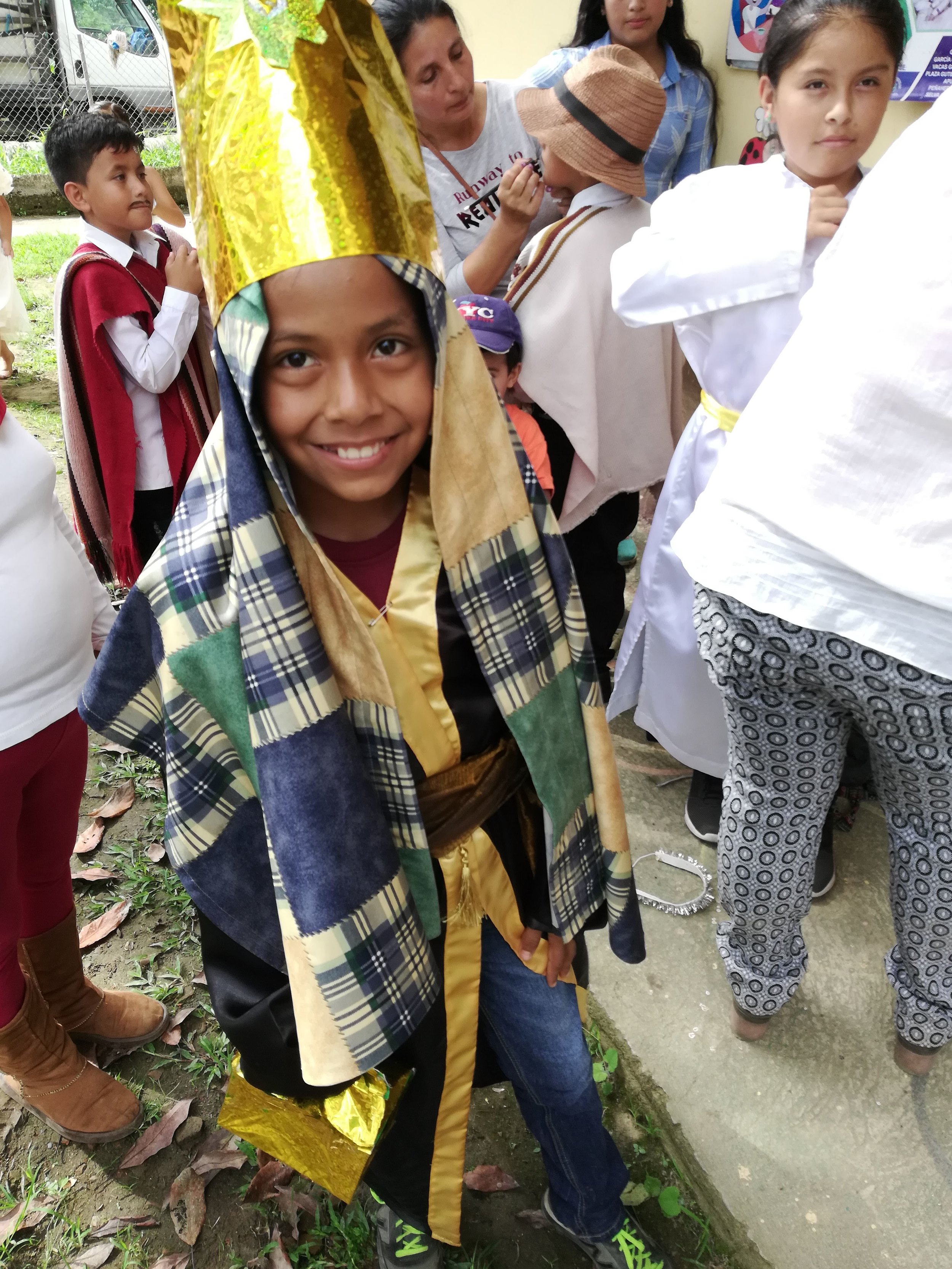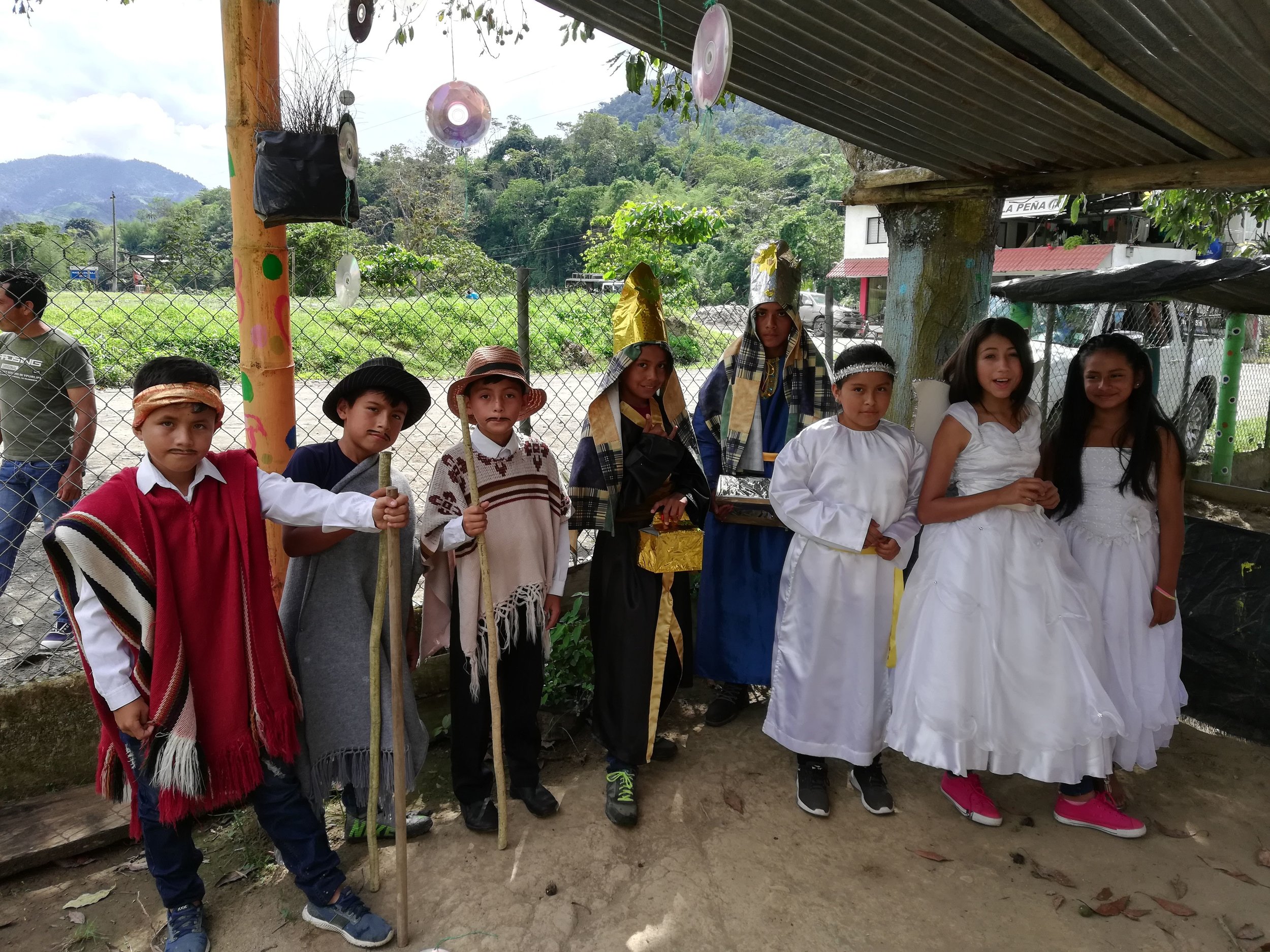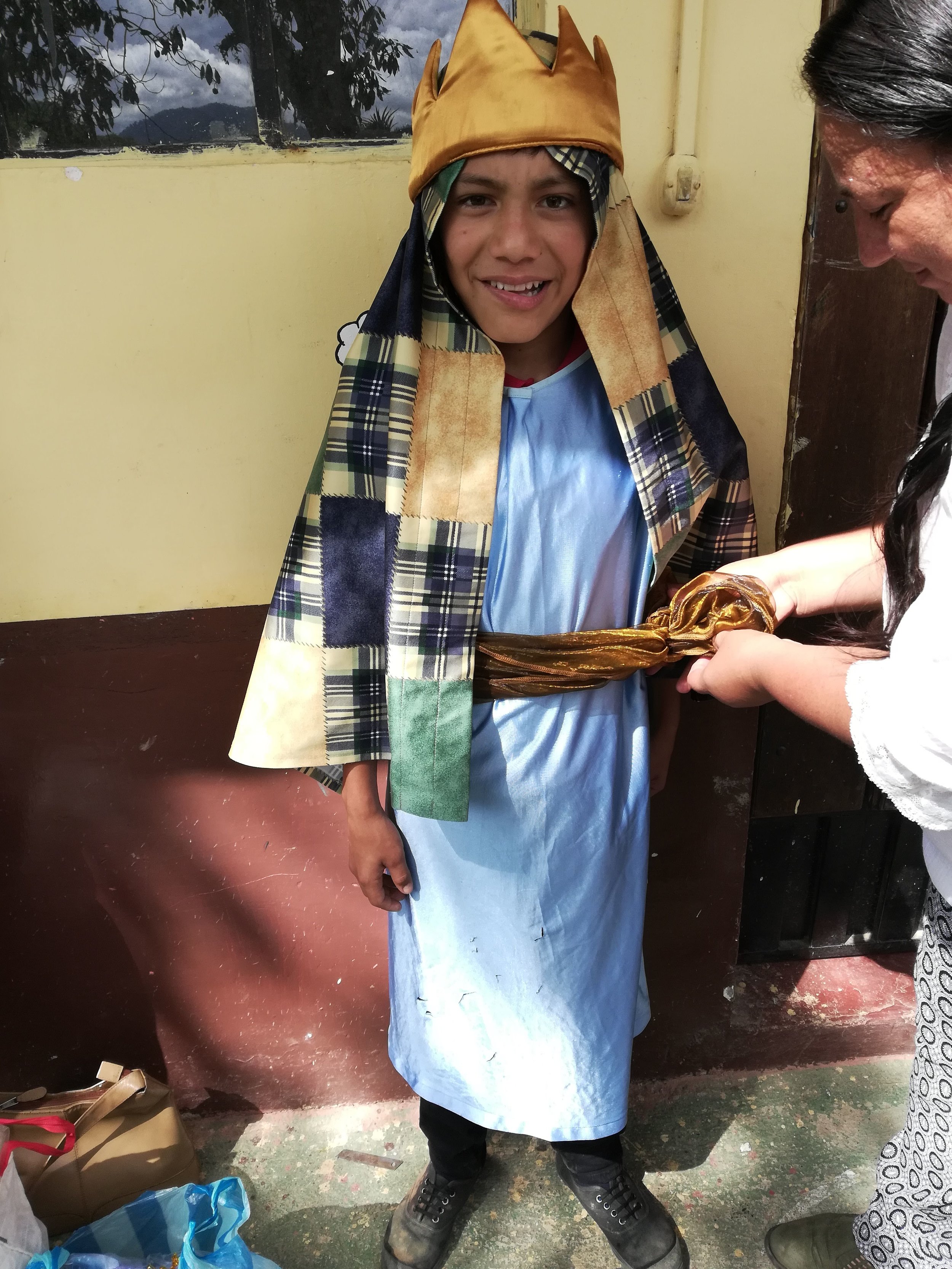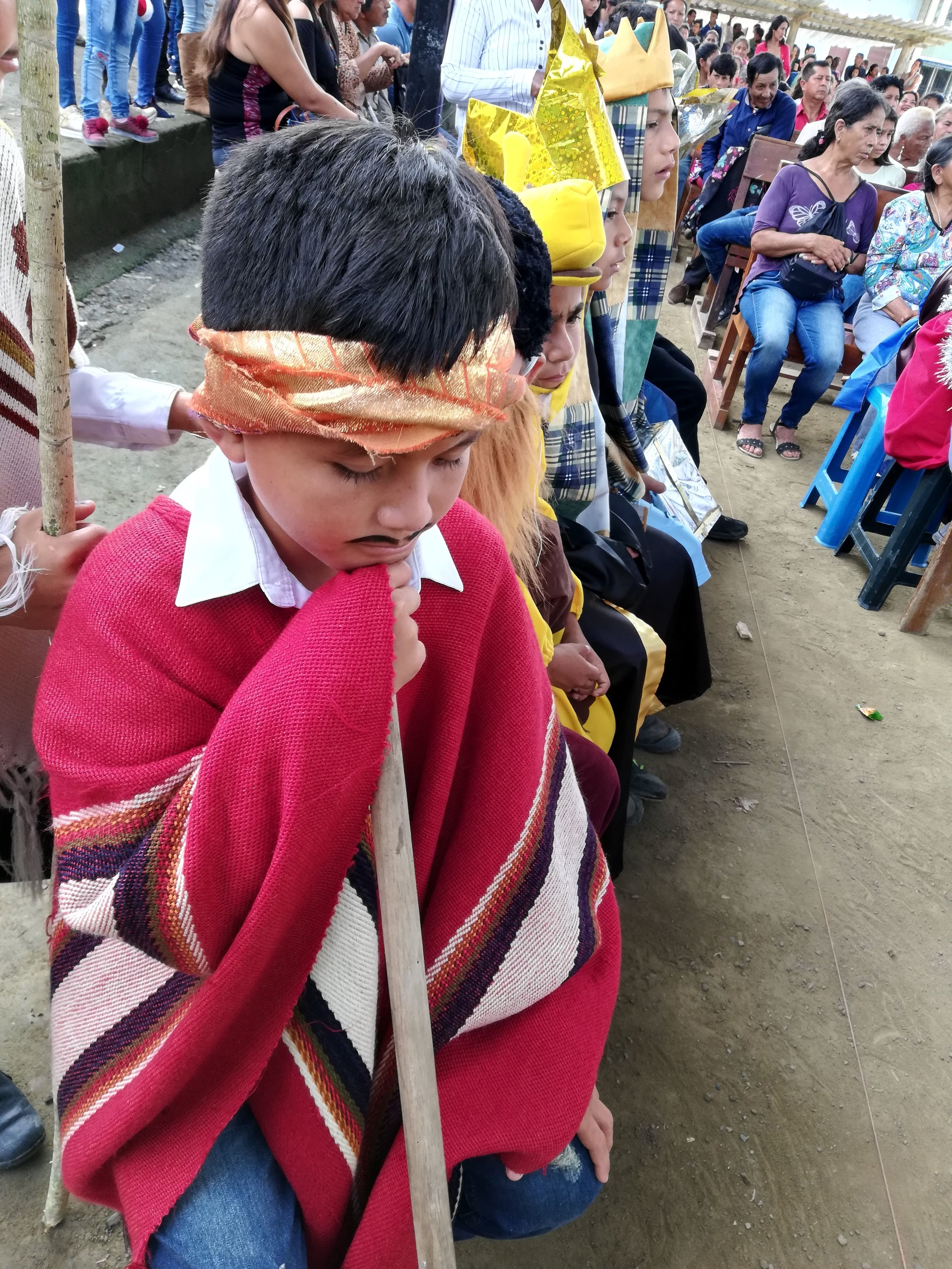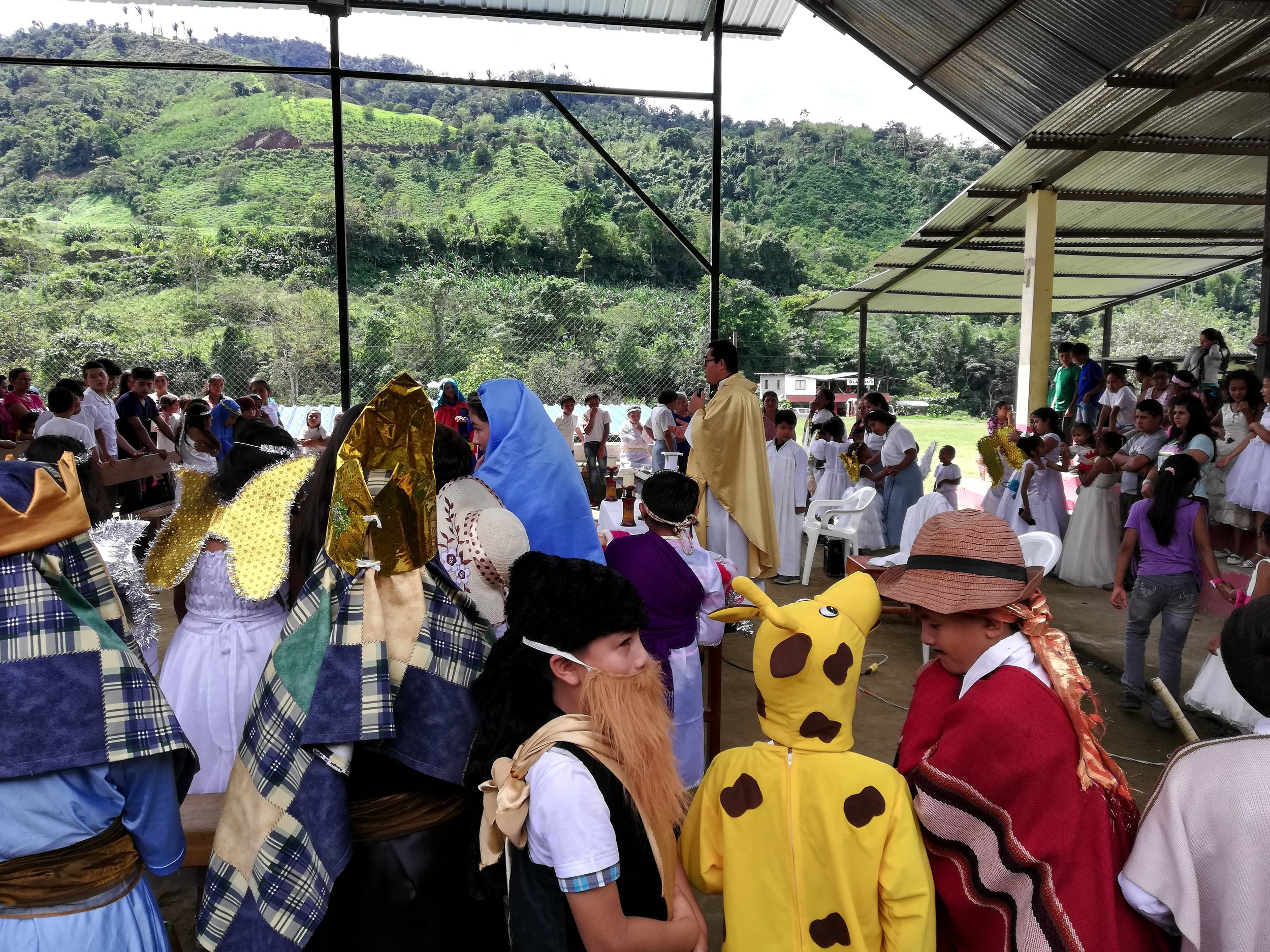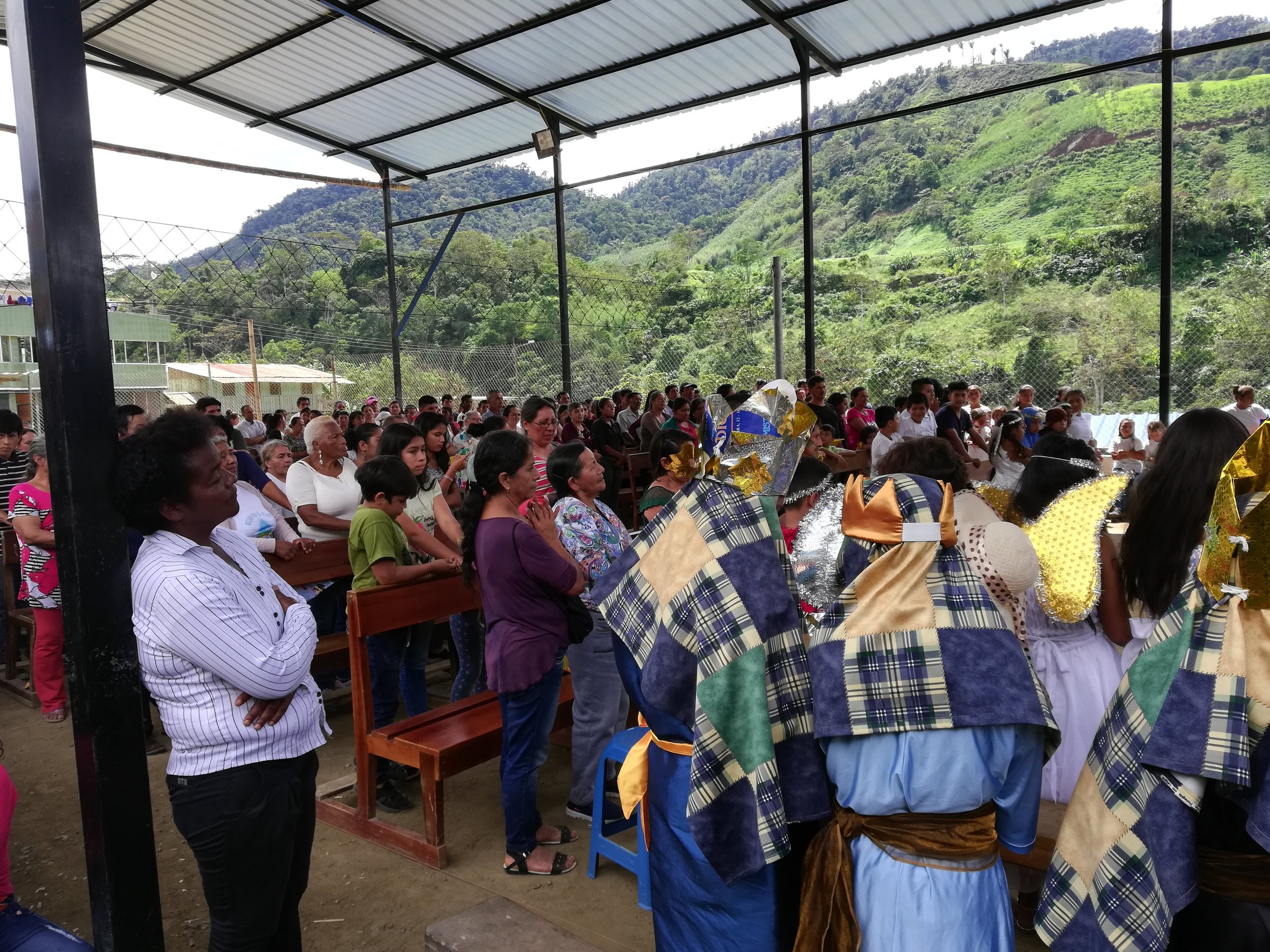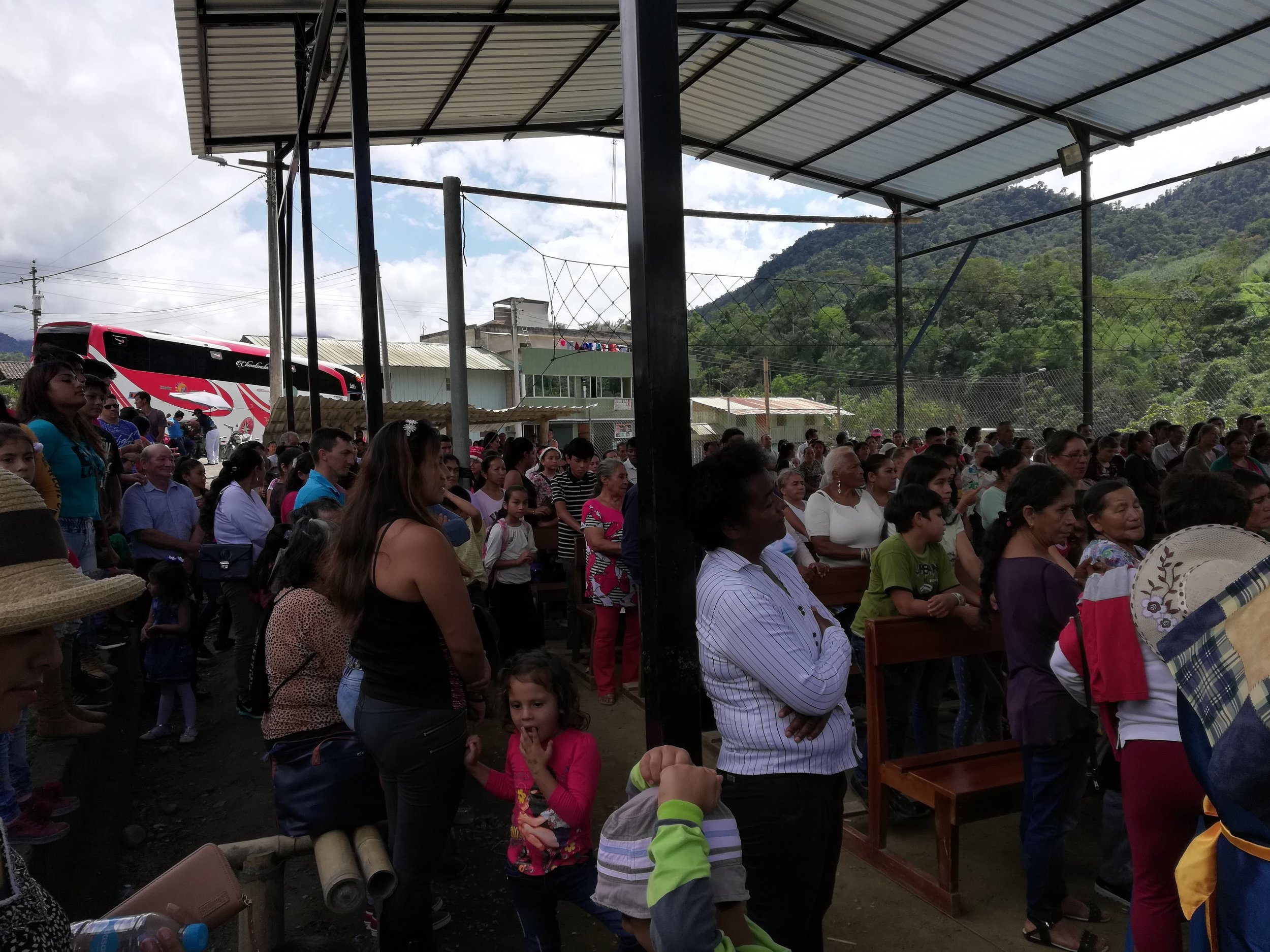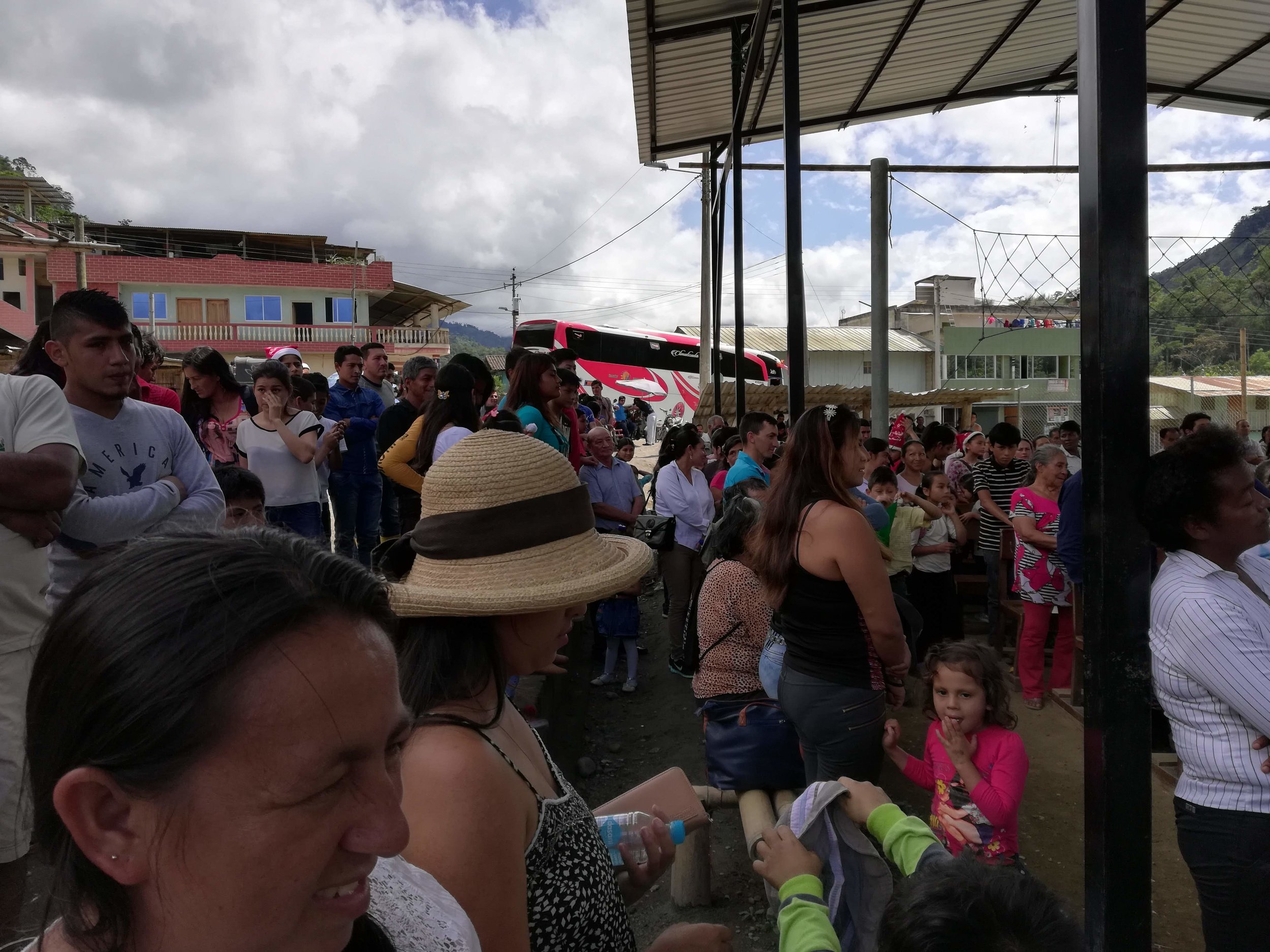I’ve finally had a good spot to write the latest update…
Decisions
Before sharing some of the good things that have been happening here, I want to first share some information about some decisions I’ve been making.
In short, it looks like this mission in Ecuador is coming to a pause. With the moving on of many collaborators from here in Ecuador over the past several years, I find myself alone here in Chontal. Most importantly, my own path and spirituality has not meshed well with that of the local church here. The last time I was here, there seemed to be a step in the other direction. I wasn’t sure if it was time to go out on that note, or if it was the beginning of something. I decided it was worth continuing another time to see if that experience would follow through.
Two things have had a big influence on my decision:
(1) In the church in Chontal, there seemed to be a reaction by the older church regulars against what I had done the year before. That showed me that the special experiences that occurred last Christmas - as in each of the initiatives, outright gifts, or activities that I’ve undertaken over the years here in Chontal - are not valued or supported. It doesn’t make sense to try to collaborate with people that are unable or unwilling to value who you are and what you bring. Or, put another way, it isn’t good for anyone if there isn’t a fit. There are more details that could be shared at another time, but in essence, there really isn’t a space for me here to do what I do.
(2) A zone-wide meeting of religious-ed teachers, clergy, and professed religious on December 3 that I attended made me aware that this isn’t just a local reality, but throughout the zone. I would not really fit anywhere in the zone, even the diocese. It was my first experience of the broader zone of parishes, because, amazingly, it was the first time I was invited to anything since I first started ministry here in 2014. As my resources are exhausted and I didn’t see any possibility for collaboration - especially as a sole foreigner who needs to be in a position of collaboration - I pretty much decided then that it wasn’t going to work in this zone or diocese.
By that time, the majority of the expenses in the process of obtaining the 2-year visa had been spent, and so I’ve decided to complete that process, so long as there are no more substantial time or money costs. It seems the wise thing to do. I’ll include more details of that below.
Of course a part of me would prefer that things be different, but I’m accepting of the reality, and I am happy with this decision and excited to move forward. I came here not knowing exactly how things would play out, open to a variety of possibilities of how I would be received and what the relation would shape up to be. In any case, those who have followed my activity in Ecuador over the past several years know that I’ve wrestled with some of these things before, and it’s good to have clarity to make some decisions. I move on knowing that I was generous and sincere in looking to have things work out, that I took things in stages - in a high-risk venture - and was open to consistently re-evaluate. I’m glad I did what I did, in the way I did it.
Turning barriers into bridges isn’t something that one person does. It’s really only a grace of God, and each of us can only be a catalyst - others have to be free to say no. This has always been my mindset, and so I’ve always sought to listen to what is happening, whether a bridge can be formed or not. It’s not my work - it’s about noticing what God is doing, and being a catalyst for it to happen. That means that the life of Jesus plays out - including his rejection and “failures”. And all that always include a process of discovery and testing.
Notice that this effort isn’t about building bridges; it’s about turning barriers into bridges. That means that I’m not starting with a blank slate, but rather where there are obstacles and barriers, sometimes some pretty big and discouraging ones. It means that I go into situations that don’t look pretty. So, there’s a risk in that, because if other folks there are not willing to let grace act, then you can be in a tough situation! But that is why a person doing that needs constant prayer and reflection, listening to God and sound wisdom and staying close to Jesus. The mission is always the same, and the same for every Christian: that Jesus’ life be reproduced in our own. That is success for a Christian. And that I feel good about.
B2B isn’t ending, but things are changing and a big step is happening. Over the next months there’ll be re-evaluation, and we’ll see where it turns up. But I am excited about what is coming, not just for me, but for all of you who have supported and been a part of this for a while. Endings are really a healthy part of transformations into new beginnings. From Christ’s death comes his resurrection and the sending of the Spirit. Something good is coming about!
In the meantime, that is not to say that God hasn’t continued to hit homerun balls! There are still special stars in the midst of all this news. So, from here on I’ll share some of the good things that have happened this Christmas season.
Jerome
Tutoring
I had been doing some tutoring in math with a few high school students, before the Advent and Christmas activity picked up. It was a good experience for both of the students, and for me. The way I tutor is what I call the “accompaniment” method. I just accompany the student in their homework and observe. It’s the best way to tutor, because (a) you see the student in their natural habitat and habits, and so the problems and successes arise organically. You don’t rely on anyone’s opinion as to what the student’s problems are - the simple doing of the homework raises the real problems to the surface, at the right time. And since students’ problems are worked out in the context of the work that is assigned to them, (b) the asides that untie their knots are immediately relevant, and (c) I don’t create extra work for the students. My job is to accompany and be as minimally intrusive as possible: just enough to help, so that they won’t need me.
I write all that because that is the way I do mission as well.
Internet Setup
I spent considerable time working out a solution to the internet issue here. It’s something that I don’t want to get tangled into, but because I use the internet here in the church house where I’m staying, I’ve wanted to (and the church has an obligation to) set up our internet access in a way that reflects the Gospel. That the antenna is still on the property - and probably isn’t going anywhere - is a story I’ve shared before. But, before I came, the church’s internet password had spread around, so that a lot of youth were hanging around the church property at all hours. (That’s one of many examples of the lack of valuing what one has.) Finally, the church president turned off the internet - but it was through her and her kids that the password got passed around in the first place. That’s not to judge harshly. Without the capacity to work out a plan, there remains a state of confusion and conflict within everyone. People feel bad not sharing passwords, because there is no clear solution. But people also feel resentful afterwards, as they lose the internet access they are paying for themselves. These are the pressures that lead to the common cultural phenomenon here in Ecuador of stealing and copying. There is a minor dose of “justice” here, little sense of consequences, and little respect for others’ boundaries or possessions. It’s because things are never thought through to a vision and plan that serves everyone and seems just. Action is taken quickly and impulsively without planning. It is self-centered, and I believe that it comes from the experience of poverty: there is never enough, so I have to get for myself. Competition, bravado, machismo underpins activity. Self-survival instincts are at the fore. That is a part of a culture of poverty.
Of course, that wreaks havoc on a society. And so we have the situation in Latin America. Where there are real solutions, community forms first: there has to be a turning point to gain enough trust-building that people recognize the power of community. That, if they work for community and self - for communion - then they don’t have to be afraid of “not having enough” and “being left out”. Without the fear, people are not driven to act impulsively, but rather can think, dialogue, and plan before acting.
So, to give you a feel as far as internet, here are some of the things that have happened in the village here. First, several years ago, a woman with the keys to the church (someone who I had to say some “no’s” to, which were not liked) one day had the internet company install the town’s internet node on the church steeple, without talking to anyone beforehand. The priest was disappointed, but did nothing about it, said nothing to the woman. I offered the priest multiple times to help set up a meeting with the town leadership and discuss a better place for the node. Nothing ever happened. So, that first move set the tone for everything else: we get our internet in our own self-internet, at the cost of the community and even the church. People start getting internet privately in their house. They have no idea how to manage the router or internet security. Their kids pass the password to others. Other youth begin to hack for passwords around the village. Some people start to sell their password to others. A young man who owns a cyber room (computers for paid use), has software that he used to hack passwords on routers, and then he would sell the passwords to other youth. Countless stories of people’s networks being bled by the multitudes of others who are hooked into them - while their own signal dwindles to nothing - and their efforts at security are to no avail. Again, the culture here - and in much of Latin America - finds no problem with sharing other people’s passwords, and pirating whatever software is expected. As soon as a password shared with anyone, you can be sure that it’s going to get around. There’s almost no respect for honesty or trust or boundaries. It’s a bit like the Wild West.
Meanwhile, youth are getting hooked. They hang around houses, businesses, etc. catching signal. And the signals have no filters, no limits, because people are not conscious of the need for them (or even the existence of them). That doesn’t cross their minds. Safety, security, health of children, that’s not too much a part of the culture.
I have proposed several times that the community organize with respect to the internet, but there haven’t been any steps to date. There are two things I propose: (a) a committee be formed that handles technology and internet for the village (there are a variety of other committees for other aspects of village life); and (b) getting public wifi access for the main area of the village. While still advocating for this, I still felt the desire to set the church situation up, according to the current circumstances. Especially because a number of people were coming to me in the church not to pray or for something related to God or their lives in the light of faith, but for the password to the internet!
After a lot of investigation, I bought another router for about $35 for the church. So, now as it’s setup, there are three networks: one for whoever is living in the house (and no one else gets that password), one for church activities (with its own password), and one public without a password. All the networks are filtered for adult content, and, importantly, the public one is only active for one hour a day. The intention is to give free access to people in the village who can’t afford internet, but need it for communication and other constructive purposes. For example, there is no cell phone signal in Chontal. Using the internet is the only way to make a phone call from a cell phone. Also, students are getting internet homework assignments (IMO, an awful move by teachers, knowing that so many don’t have easy access to the internet). Much government and hospital business is now being conducted over the internet as well. In short, one filtered hour a day gives access to people who need to make important use of the internet, while also guarding from people getting hooked and hanging around the church.
It has another purpose too: it serves as a model for the other homes that have internet. Learning to manage your internet not only gives you back control over what you’re paying for, it also gives you the chance to be generous. Currently, people are living defensively about their internet, in anxiety that they’re being robbed and can’t do anything about it. So, they can’t be generous. There’s the false generosity - the inability to say no to requests because you feel like should be generous, but that’s accompanied by the nagging feeling that you’re giving away your dignity - that many partake in. That’s not real generosity, it’s just contributing to the destruction of community. The way I’m pointing is to put some simple boundaries in, say no when it’s appropriate, and get reasonable control of your internet so you can be generous with it and everyone can have at least what they need.
Depending on how long I stay in Chontal, the plan is to offer to go to people’s homes and help them to manage their internet and get control over it - and invite them to be generous with it. If there were a few homes that put their internet in order and then offered an hour free to those who don’t have access, then people would have a variety of hours in the day to get access. You would be approaching a public internet zone. (Speaking of which, the neighboring village has a true public internet zone. Although the speed can drip, at least they organized enough to do it.) And there is something to be said for a public internet zone with limited, as far as creating addiction in youth.
The aim is to catalyze better management of this resource by the community through my own example and then direct assistance. The overall effect is really on the whole community and how it manages it’s resources, but principally on the children and youth, who currently have no real safeguards in place regarding internet use. Whether I will be here to move it along, and whether people will embrace the generosity part and stick with it, remains to be seen. But I do what I can with the time and resources that I have.
Now … I’ve written a lot about the internet not only because I’ve dedicated some good time to resolving it (I felt called to address technology way back in my first times coming to Chontal), but also because the dynamic I’ve described is the same for almost every aspect of life here. If you can understand the picture I’ve tried to paint about the internet, you’ll understand a bit of what everything is like here! And so, by addressing the internet situation in the way I’m doing, it has an effect on everything else here, too.
This is important in understanding how the Gospel enters into a culture! It is not only through the expressly “religious” activities, such as the vocal preaching of the Word - though that is essential. It also must come in by at least one practical way that is fully reflective of the way of life of the community. This internet situation is one of those ways.
I want to point out that, as you might imagine, growing up and living in a culture like this has some advantages too. There are probably no people more resourceful than poor people. The culture in the US tends more towards professionalism than amateurism now. To build or accomplish something, we bring a team of professionals together. People prepare in their careers to be professionals, whether it’s white collar or blue collar or whatever. Companies assemble or hire teams of “qualified professionals”, meaning specialists. That is the socio-economic system in the US. However, in rural Ecuador, there is not such an emphasis on specializing, or professionalism. People are more jacks of all trades: amateurs. And that can be really, really effective - at least in the short term - in chaotic, disadvantaged, or disorganized situations, which often exist in small business or small village environments. When folks from the US enter into these environments that do exist here, they have to learn to balance cut back on their “professional” mindset by letting their amateur side, which is largely put to sleep in US culture, wake back up. It puts a person back into balance from being isolated in one culture or the other.
Religious education and the kids
Coming into advent, the religious ed classes started to wind down, and shift over to games and activities. I had the idea of decorating the parish activity room in a Christmas theme that puts the kids’ “fingerprints” on the wall. It never has decorations, and when it does, it’s some old picture of a pope or Christ - there’s no sense of liveliness. So, I set up the room to have a place for each class to put up some artwork, each having a Christmas personality: the wise men, Mary, Joseph, the shepherds, etc. It was like the room became a giant Creche. It came in handy on Christmas Eve when we had those personalities dressed up and we had the Christmas carols. Each student also put their fingerprint and name on their work, and each got a star - coming from a trail of stars that reached up to the Christmas star. So for Christmas, the walls were covered with the fingerprints of the children of Chontal: the stars of the hour!
In any case, putting the kids’ work on the walls is a big thing, although the religious people and the clergy here don’t value it. They would prefer that the kids simply memorize, repeat after them, and do what they’re told. In fact, kids’ creativity here has been so beaten out by church, school, and home, that kids are practically unable to use their imagination when drawing. They need to copy or trace. Only one of the 25 or so pictures was drawn from a child’s imagination. The others were copied from a book, or from another student. Once again, instead of offering a freeing Gospel from this somewhat slavish way of life, my experience has been that the church here has been a principal catalyst in reinforcing it.
This video is a great summary of what the education of children is like here in rural Ecuador. You don’t have to understand Spanish to get what is happening in the video: the girl is taught to repeat what is shown her (“obedience”) instead of being creative and thinking. In the second part, the second teacher gives Vane liberty as to when to start to draw and what to draw, and Vane is taken aback and clearly confused and afraid. She can only repeat what someone else has done. This is exactly the response I received when I invited the kids to draw, and whenever I invite creativity. Again, this state of things is facilitated primarily by the church here.
This is the state not only of the children, but of the culture here in rural Ecuador. Which is why a Gospel that frees is a new thing and difficult for the people to process. The people need support in embracing it. When that support is lacking, and when instead there are other voices that reinforce going back to the repeating way of life, it’s almost impossible for people to embrace the message. This is the condition that I encounter in Chontal.
Making the Manger Scene in the Church
Making the manger scene in the church is an annual activity that brings people together. More important than the finished manger is the experience of communion in doing the work. This year we didn’t have too much of a turnout, but Ines, the church “president”, does a good job of putting things together, and some of the kids participated as well. It turned out well, and folks had a good time. I brought some artificial snow to put into the manger, and that was a hit as always.
Decorating the Church
Later in the month, we got to decorating the church. Several sisters from one of the families, who are good with arts and decorating, came by and spent a chunk of time setting up the front door of the church and cleaning. Ines and I put to decorating other parts of the interior. Again, some of the kids came by to participate.
Visa progress
I’m applying for a 2-year visa as a religious volunteer. Once the visa is complete, I will post an update on the costs and how the money that was raised to cover the visa has been spent. As of now, the costs have evened out to be what was expected, except the cost of the visa itself. I had budgeted $250 for that, the amount listed on the Ecuadorian government website. However, it doesn’t appear that I will be charged for that, for whatever reason. The apparent last step (these things can change) is to visit Quito on Jan 7 to hand in the last paperwork and passport, and the woman who handles these things on behalf of the church will run the errands to get the visa processed the same or next day. So, I’m supposed to have the visa by Jan 8, at no more cost than my travel to and from Quito. But, as I said, that can change.
Getting the necessary documents has been a journey - literally. I needed to get a legal affidavit stating in very specific words that I would be a volunteer without pay, and only participate in church activities in the diocese. After 2 hours and $25, I had my affidavit from a notary public in Quito, only to find out after visiting the church agent (45 minutes away by metrobus) that it was missing 3 words it needed to have. I had to make the trip back to the notary, wait another 2 hours for the new, updated document with the 3 words. Thankfully, they didn’t charge me (they didn’t copy all of the text I had originally gave them).
I also had to get a copy of my migration history into and out of Ecuador. You have to at some point visit a bank to make a payment into the govt account and bring a receipt back to the govt agency. Someone told me to go to the bank first, as I would be re-directed there anyway. I went to the bank and waited 45 minutes, only to be told I need to go to the agency first. I went to the agency, then to a nearby bank, then back to the agency to one line, and then another one. Finally, I got the document without too much wait time. Such are the “tramites” as they’re called.
The local bishop is a temporary administrator - the previous bishop had returned to his home of Italy. Since he was new, I had to first wait for the local priest to talk to him (difficult to do with transitions). Without the bishop’s “yes”, there’s no point in doing much of anything that costs significant time or money. That got delayed and delayed, which is why it has taken so long. But once the priest told me the bishop was supported, I set everything in full gear.
I called and set up an appointment with the temporary bishop, and the secretary was obliging. Later, she got back to me about a change. Since time was tight, I agreed to a 5pm meeting. The problem is that the bishop is 5 hours away, and there are no buses to return to Chontal at that hour. I decided to get a place to stay in Otavalo, about 45 minutes from Ibarra where the bishop is. Otavalo is one of the world’s leading commercial centers for indigenous culture. I got my charango there at the Plaza de Ponchos, the largest indigenous market in South America. It was a good night stay there, I was happy with the hostal/hotel I found. The meeting with the bishop was delayed an hour, but we finally met and the secretary printed out the signed letters I’d need to bring to the church agent for the visa.
Plaza de Ponchos, Otavalo
My room in Otavalo, $12 a night w/ private bath
Unfortunately, when I got back to Chontal after everything, I realized that I left the power cables for my computer in the hotel in Otavalo - 4 hours away by bus! I called the hotel and they found the cables. Fortunately, a neighbor was going there the next day, and after a few more phone calls to the hotel, the cables made it back. Without those, I wouldn’t be writing this!
Christmas Novena & Eve
The novena started on the 16th, and finished on Christmas Eve. It didn’t have quite as positive an energy as it did last year, in part for some of the reasons I shared in the introduction. Maybe the novelty had worn off as well. But in any case, we did something similar to last year: the religious ed teachers (some new ones) alternated in leading each night; we visited a different home each night and the host family participated and hosted food; we found volunteers each night to fill out the characters for the Christmas procession; we blessed different members of the community each night, according to a variety of Christmas themes; and sang. The charango got a good workout! We also had a presentation of Christmas carols after the procession on Christmas Eve, as well as the Mass with the priest at about 10:30pm, all like last year.
On the other hand, because I had been sick, and because there was some push back from some of the church regulars who wanted to be in control (so there wasn’t as much positive energy and overall involvement), I didn’t develop anything too creative (except for the reflections I gave and a few other things), which would have been nice.
The reflections are here, starting with Get An Exciting Life and going through You’ll Need Discernment to Notice the Star. The versions I shared in Chontal were simpler than these English versions, but the main stories and points and scripture references are the same. I used some props and volunteers at times in the reflections in Chontal.
This year, two young women began teaching religious ed, and so they also were leading the novena for a few nights. One of the girls was the leader of the youth group that we had back in 2016. She has recently graduated high school and is studying education at a distance in a program, while the other girl, who was involved in the youth group before, is finishing high school. She actually volunteered to be Mary in the Christmas Eve procession, while it was also her turn that night to lead the novena that night. She was excited to do it. What a great experience for her, and I was happy to see them both step into a role of participation and leadership in the community, using their gifts and talents. They said they had a good experience. And I should say, if the church regulars had their way, the same “established” people would always be doing the directing and talking, and those types of opportunities would never open up for young women like them.
Christmas Eve is the big procession, and people dress up for different roles. Then there’s a procession from the church to the final house for the last night of the novena. We had the novena prayers and song and Gospel reflection, and then the host family prepared food for everyone. The family whose house we were in played an important part in the Christmas preparations this year: the daughters had decorated the church, and their father was the angel Gabriel for the procession. So after the food, we began the procession, which included some reading of parts to re-present parts of the Christmas story, starting with the visit of the Angel Gabriel to Mary just outside the house we were in. Then, we went across the street, where Gabriel appeared to Joseph in a dream. Then we began a walk through the village, stopping at 4 different homes to sing the “Posadas”, which are short verses that represent Joseph and Mary being rejected at peoples’ homes while searching for a “posada”, or a place to sleep. We reached the church, where Gabriel and the angels announced to the shepherds (we had to pull together volunteers for missing shepherds!), and afterwards the three wise men followed the star to a conversation with Herod and then to the holy family, seated at the entrance to the church.
Video: procession leaving the church
Video: procession to the novena house through the pueblo
Video: more to the novena house, and a pause!
Video: here we are at the house, after the novena, getting ready to start the procession
After that, the characters led the everyone into the parish house for the Christmas carol presentations, in which a number of families got to sing a chosen Christmas carol. After that there was some more music, and since we seemed to finish early, a number of people left to come back later for the Mass, which we had when the priest came at about 10:30pm. The night wrapped up with the annual hot chocolate and bread!
Video: Kids singing a Christmas carol
Video: Some more kids singing a Christmas carol
Video: Real local folk music (notice the sheep in the foreground)
Christmas Gathering on 25th
Chontal is one of about 13 villages in the local parish, which has one priest. Each year, each village typically has its own Christmas novena, ending on Christmas Eve (as you’ve seen above). This year, the priest wanted to have a Mass and celebration on the 25th, in the village next to Chontal, called Magdalena. That’s the seat of the parish, where the priest lives. So, there were preparations to do performances on the 25th.
The priest invited the children in religious ed and their teachers to dress up as is typical in the Christmas characters, and to prepare something like a Christmas carol together. There were also all the other logistics to plan, which I wasn’t directly involved in. But I was involved in gathering the teachers and students and coming up with and rehearsing for the performance. We got into groups of Christmas characters, and we sang a Christmas carol in parts. One of the other teachers had a guitar, and I got the charango going.
Anyway, the preparations for this were an added burden on already busy teachers and students, who have families to tend to. It stressed the local celebrations as well. During the only meeting I was at, it was recognized that there wouldn’t nearly be enough food to feed everyone. That’s when I offered to buy another pig.
Well, one pig was donated by the local government. There were about 1000 people expected to attend this Mass and celebration, and that was not nearly enough. We needed another pig, which would cost $250.
A little background first. Last year, before leaving, there was supposed to have been an outreach started to those most in need. I met with the priest and 3 people in Chontal who expressed some interest in being a part of this ministry. I gave the priest $80 to contribute to get it going, and there was other money available for it. Well, I got back, and absolutely nothing had happened. The food that had been collected last Christmas, as part of the first step in this ministry, had been left. Ines noticed that nothing had happened, and then decided to give it away to some people, because nothing was happening with it.
In my last fundraiser, I mentioned that 10% of the funds - $175 - would be contributed to this outreach ministry. Although the priest said he would still like to do it (a lot of talk, but no action), I decided it would be better to use the money for something else. That’s when this opportunity came along. So, the $175 - plus another $75 from mission funds - has gone to feed the crowd at the Christmas celebration on December 25. It’s been used to buy another pig.
The program and Mass went about pretty well. Our group from Chontal sang well, I was proud of the kids. Though, although the priest states he doesn’t want competition, he doesn’t really do anything to quell it. Everyone wants to be the best, to be first - including the adults. I’m not a fan of it. In fact, our guitar player brought a “ringer” along to make us “better”, who has nothing to do with the religious ed program. I don’t think a lot of these things really are about the spirit of Christmas, as much as having a competition. That’s why, in the situations where I start to organize, some are disappointed that it’s not all about coming out ahead of the next person. But some are very happy that it’s not about that, and a new spirit opens up.
Anyway, at the end, I was to come out as Santa and give out the navidades, the bags of Christmas candies. At the planning meeting we had, I offered to do it only if people wanted it. I offered hesitantly, because it’s a lot of effort and Santa needs a helper with him. It takes over a half hour to dress up, and it’s really really hot and difficult to navigate walking and handling things because of the loss of visibility. To make all that worthwhile, Santa needs to come out at the end - because kids go a little wild - and give out the navidades.
Well, the end arrived, and Santa came out and the kids were all excited. After I gave my few words about where I get my jolly generosity (God), it was time for my helper to … wait a minute, he’s not there. He had the snow I was going to make. So after a bit I spotted him, and the snow making started to go south. Staying as jolly as possible, I made it to the water fountain to start to make the snow, as my helper had disappeared. Well, then it was decided that the navidades would be moved to the other side of the field, where the food was being prepared. A massive rush left Santa behind, alone, wandering now with a few children who were excited to help Santa. I had no idea where to go, what was really happening, because I was occupied while they made the announcement. I found my own way to the food stations, where there was chaos, and Santa had no place. The others, who decided in the planning meeting about Santa, were giving out the navidades. When I approached and offered, they really didn’t make a way. I really got all dressed up - and missed half the program - for nothing. And I - or rather, you donors and I - paid for the pig!!
The times I arrived as Santa at the school in Chontal, nothing like that ever happened as far as the adults - the teachers and organizers - basically abandoning me to myself. And I have to admit, the reason I came to the school in the first years, and not the church in Chontal, is because I suspected as much. But as this was my first collaboration at the parish level, it was yet another confirmation that collaboration in this parish and diocese is not a fit for me. There is the expression, “Fool me once, shame on you. Fool me twice, shame on me.” So, it isn’t going to happen again!
Breaks in Mindo
Just after Christmas, and after New Year’s, I was able to get away to be alone and pray and relax a bit in Mindo. In Chontal there isn’t much rest because I have little privacy. Nor in Quito, as it’s a bustling city. So, here I get to have a little space where I’m not working or doing errands.
When I come to Mindo, I often stay at Casa de Piedra to be alone. (I’m there now writing this update.) I’ve know the owner and staff for several years, and they give me a bit of a discount and other “perks”.
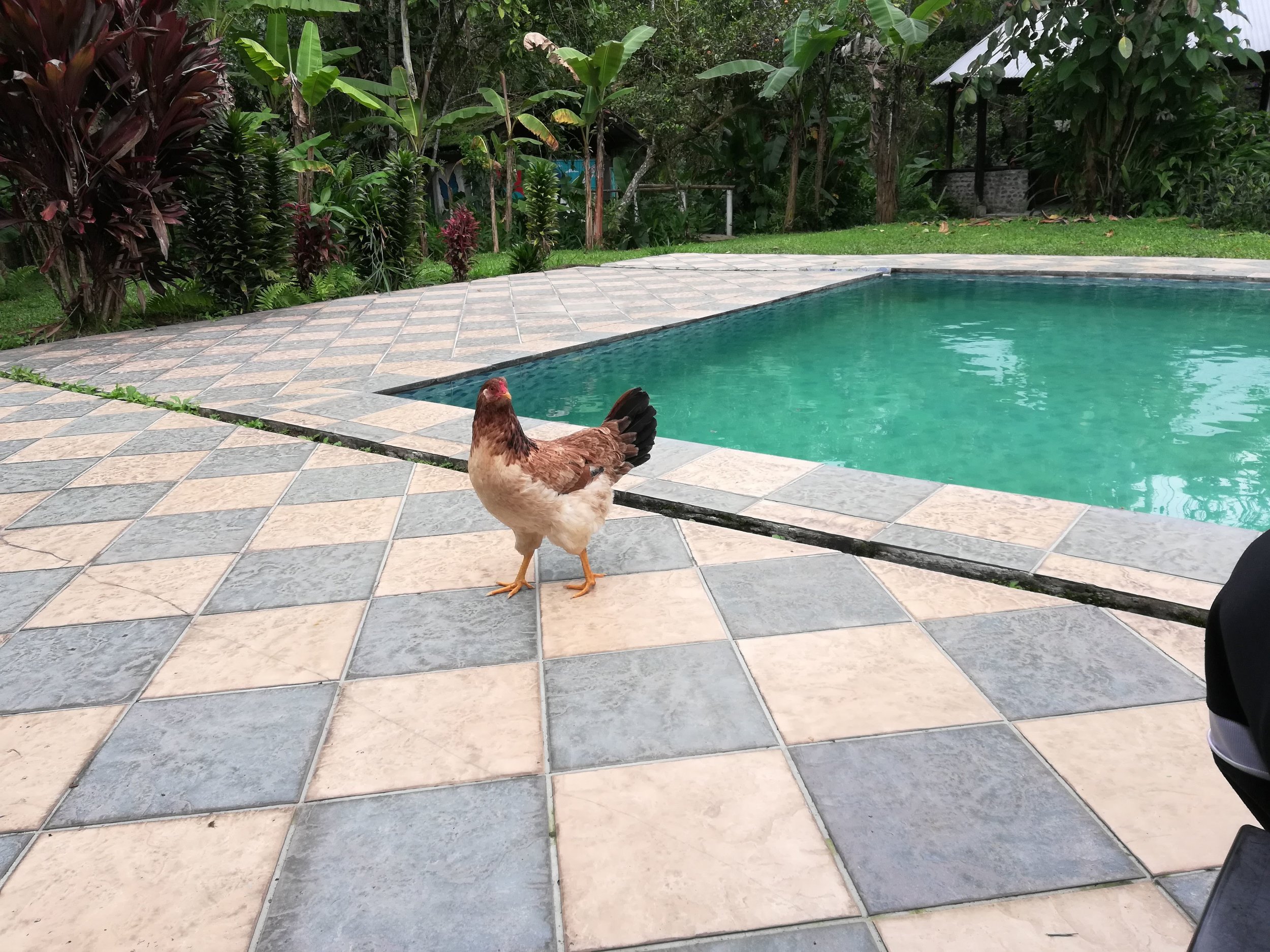

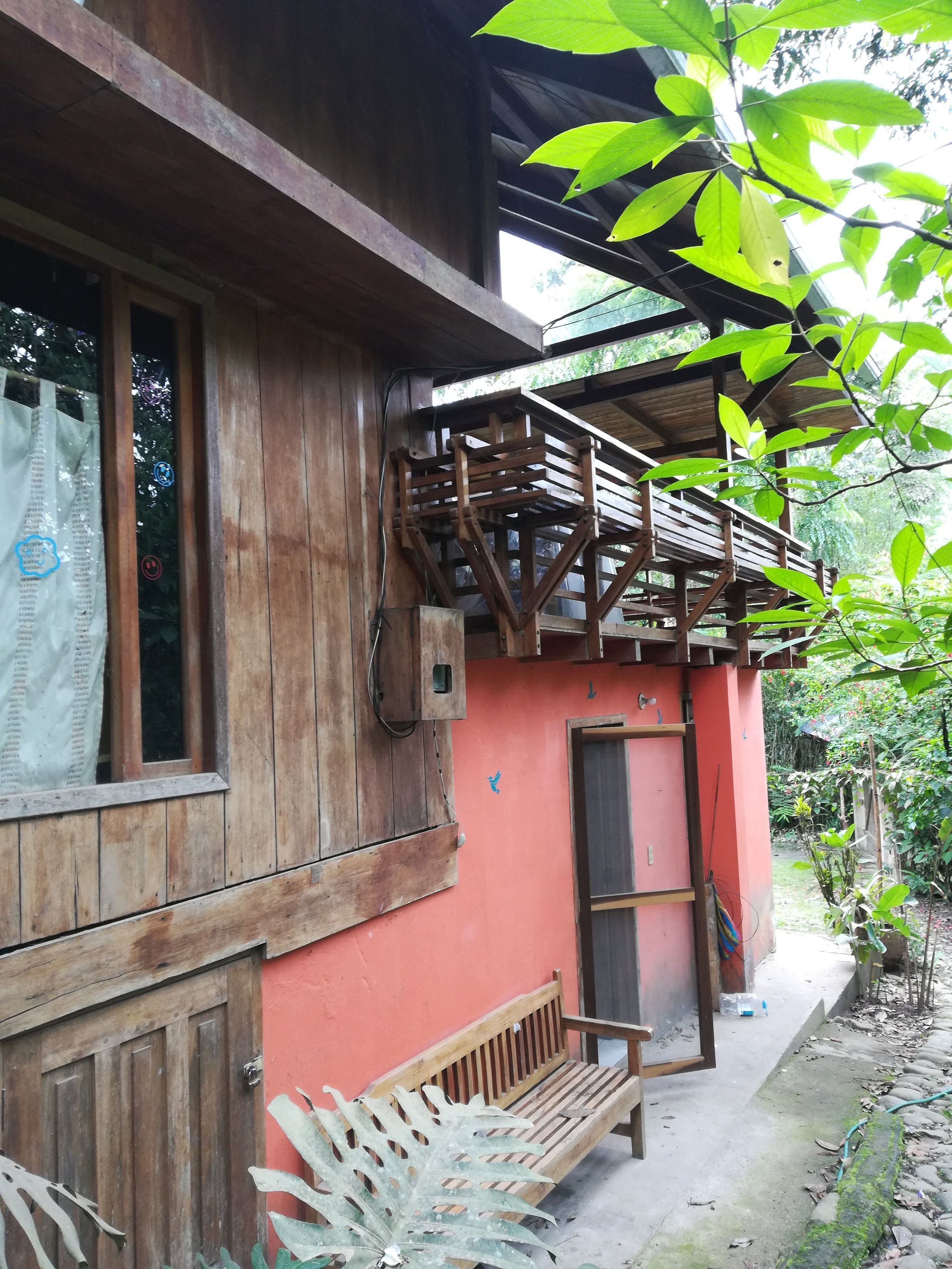
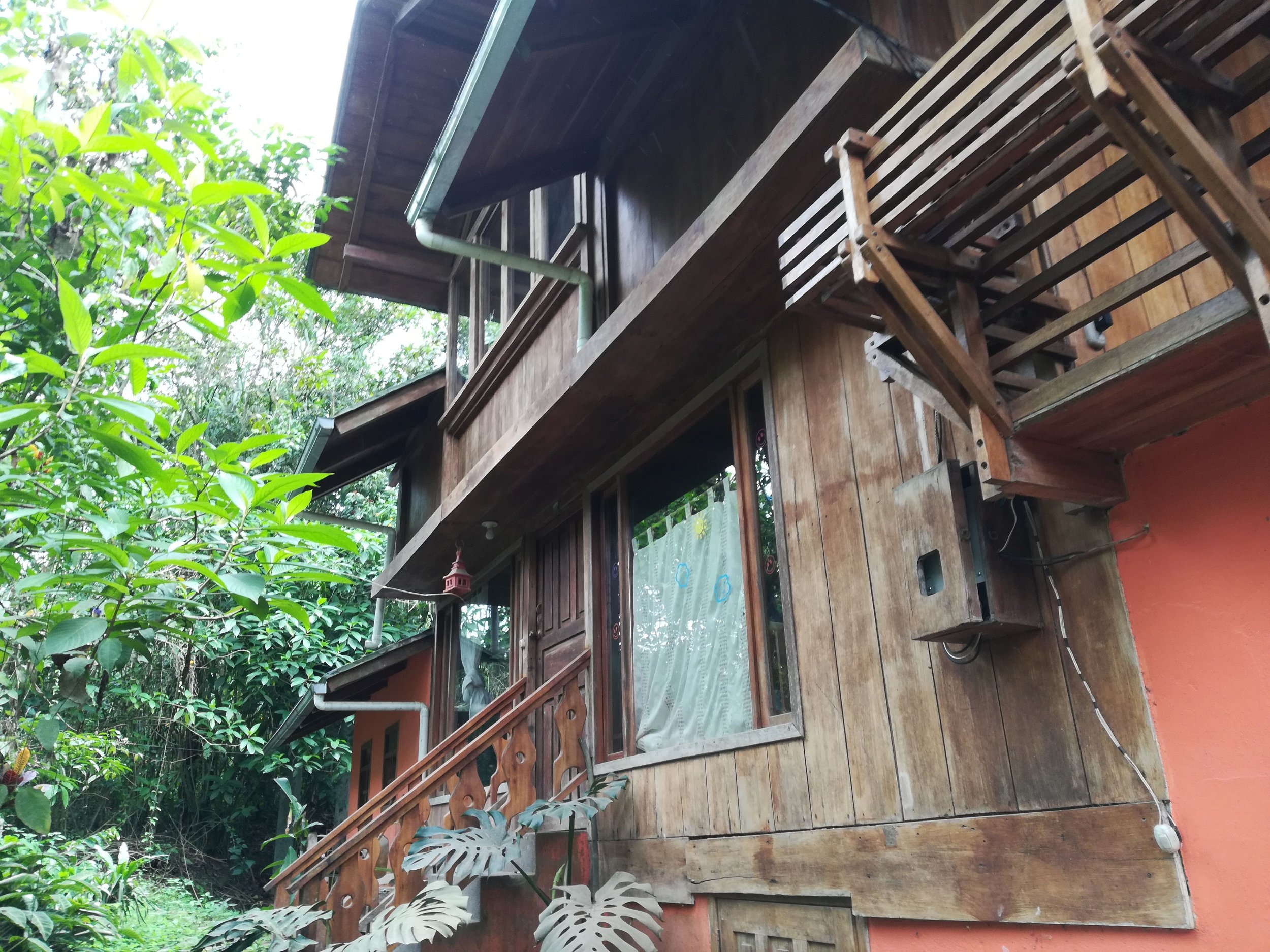


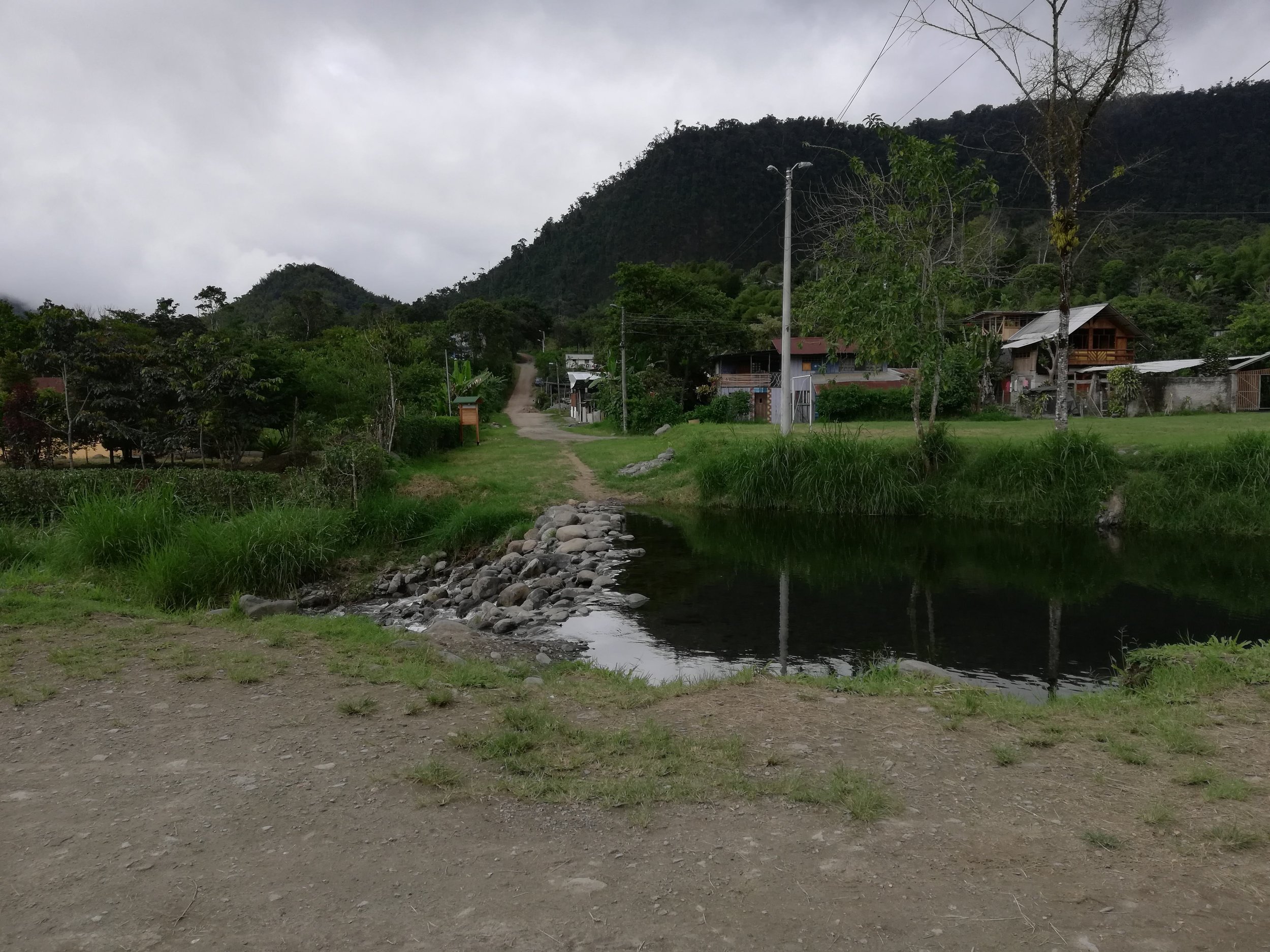

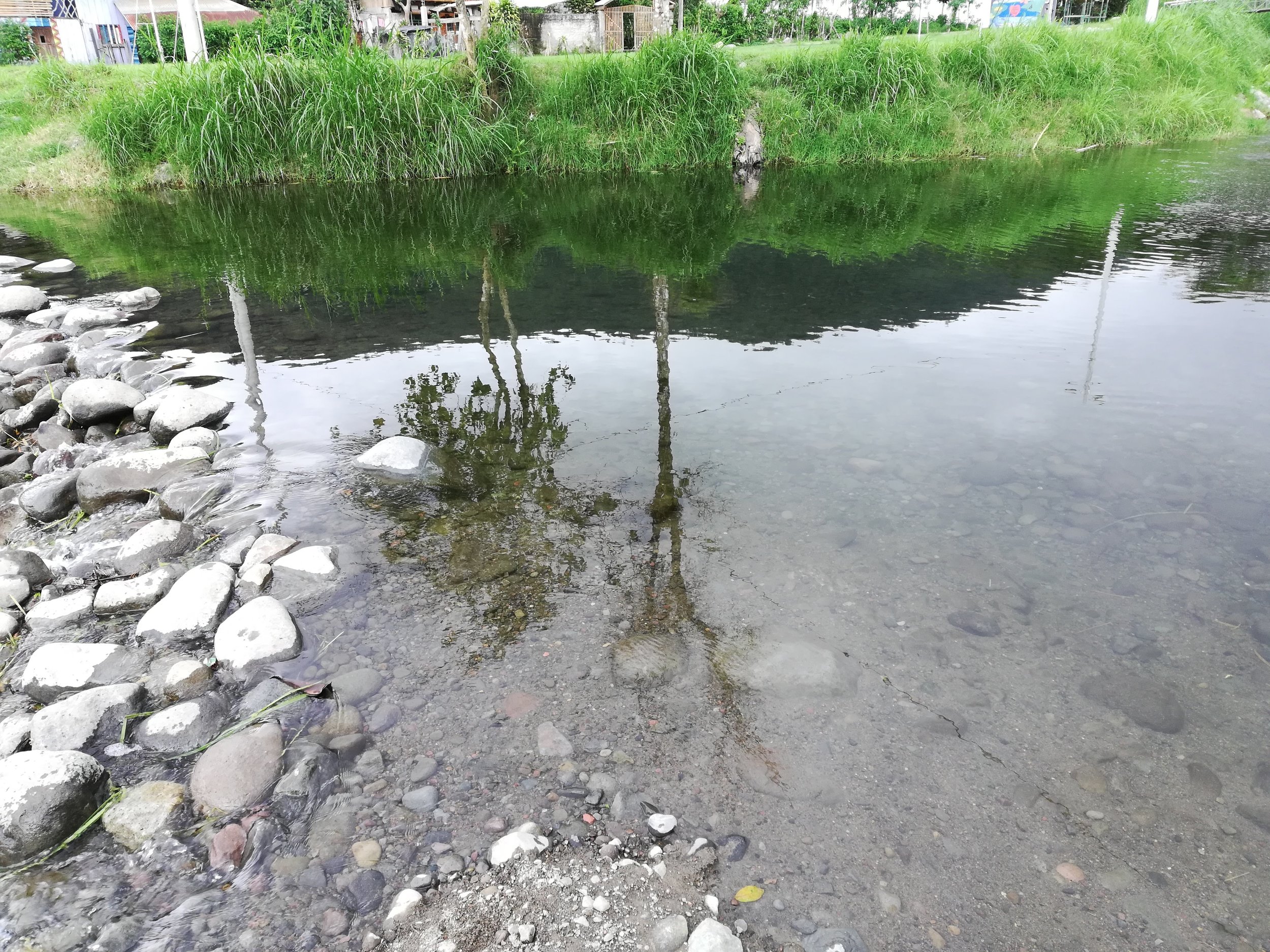


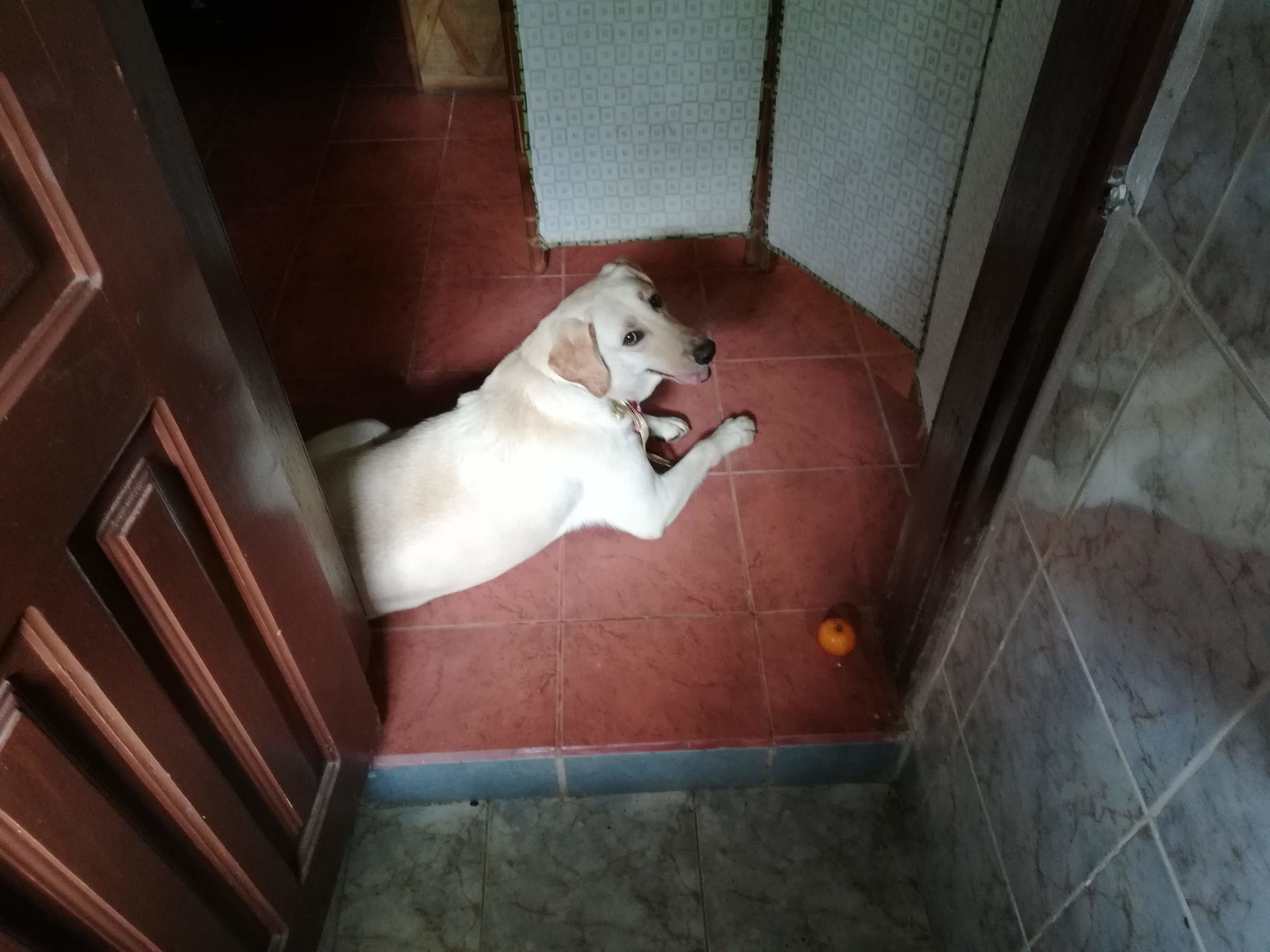

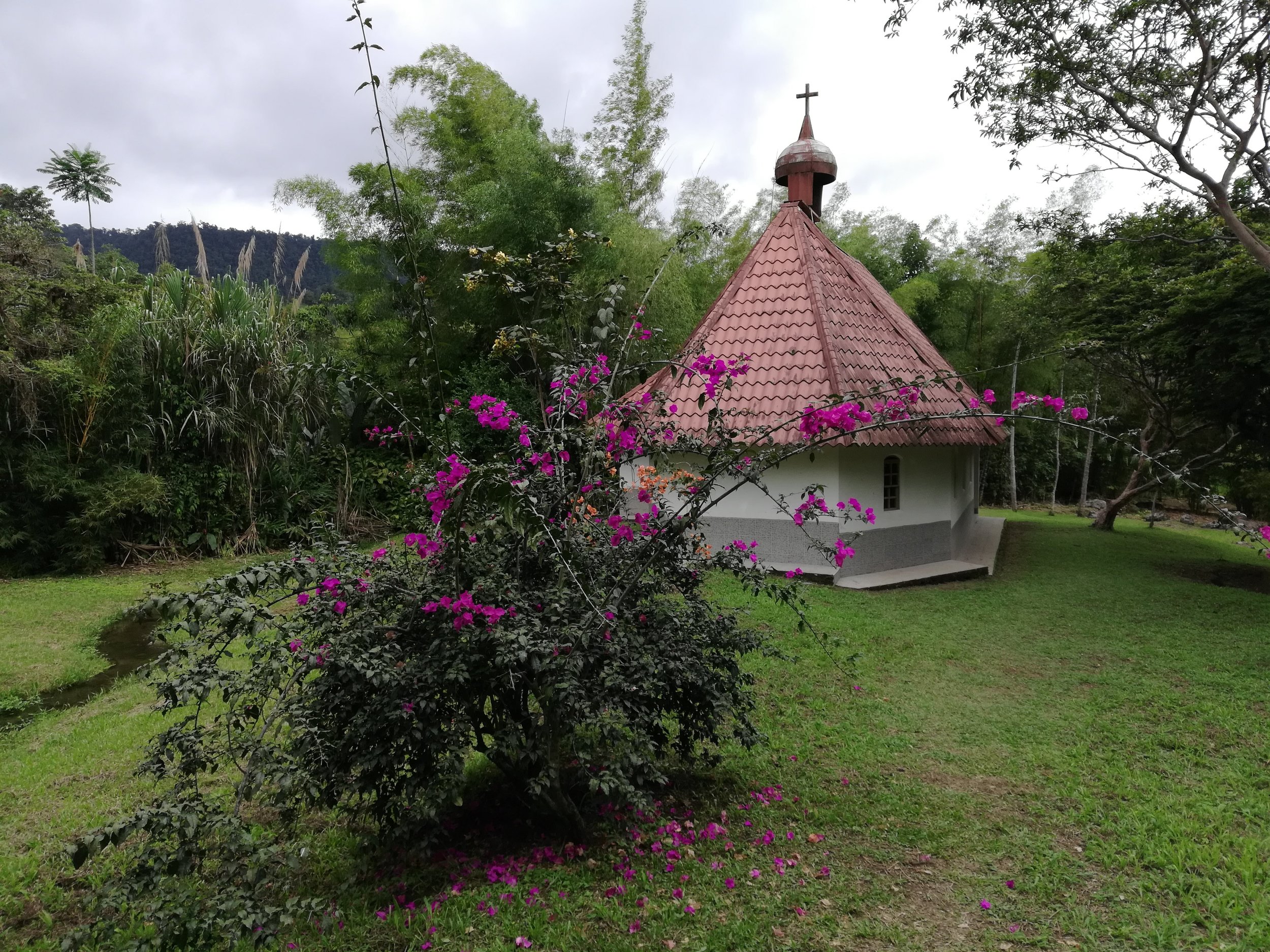
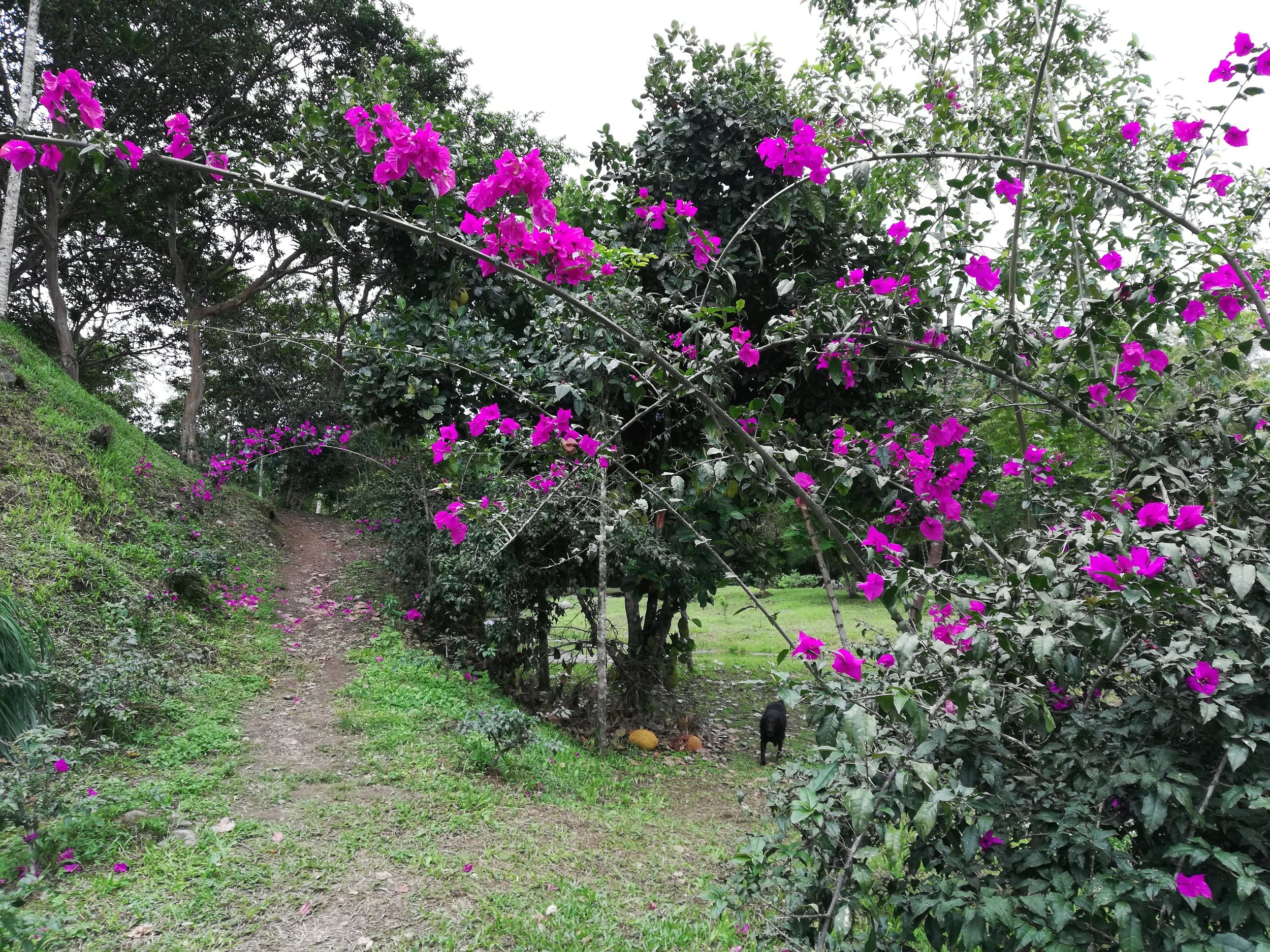



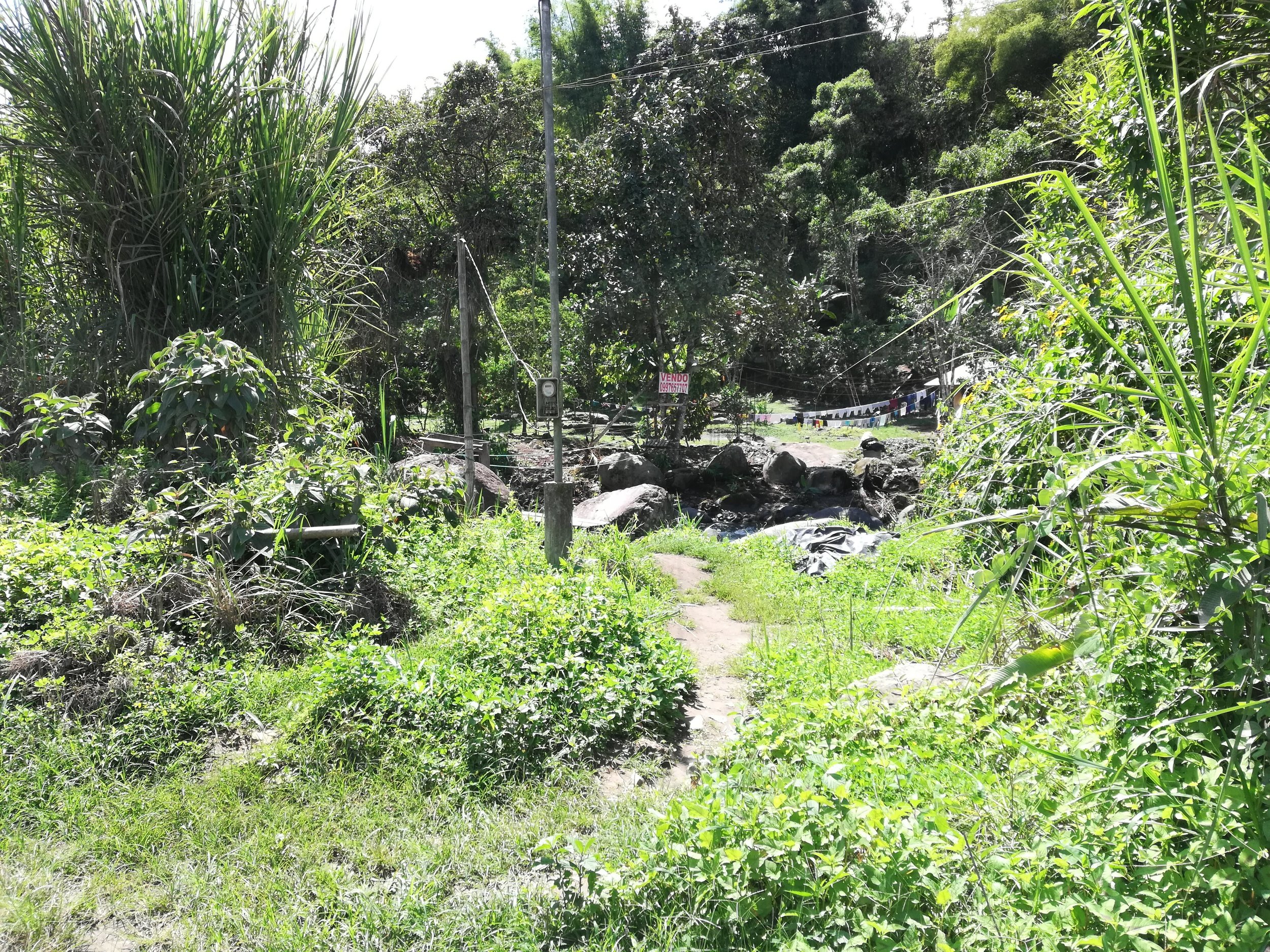
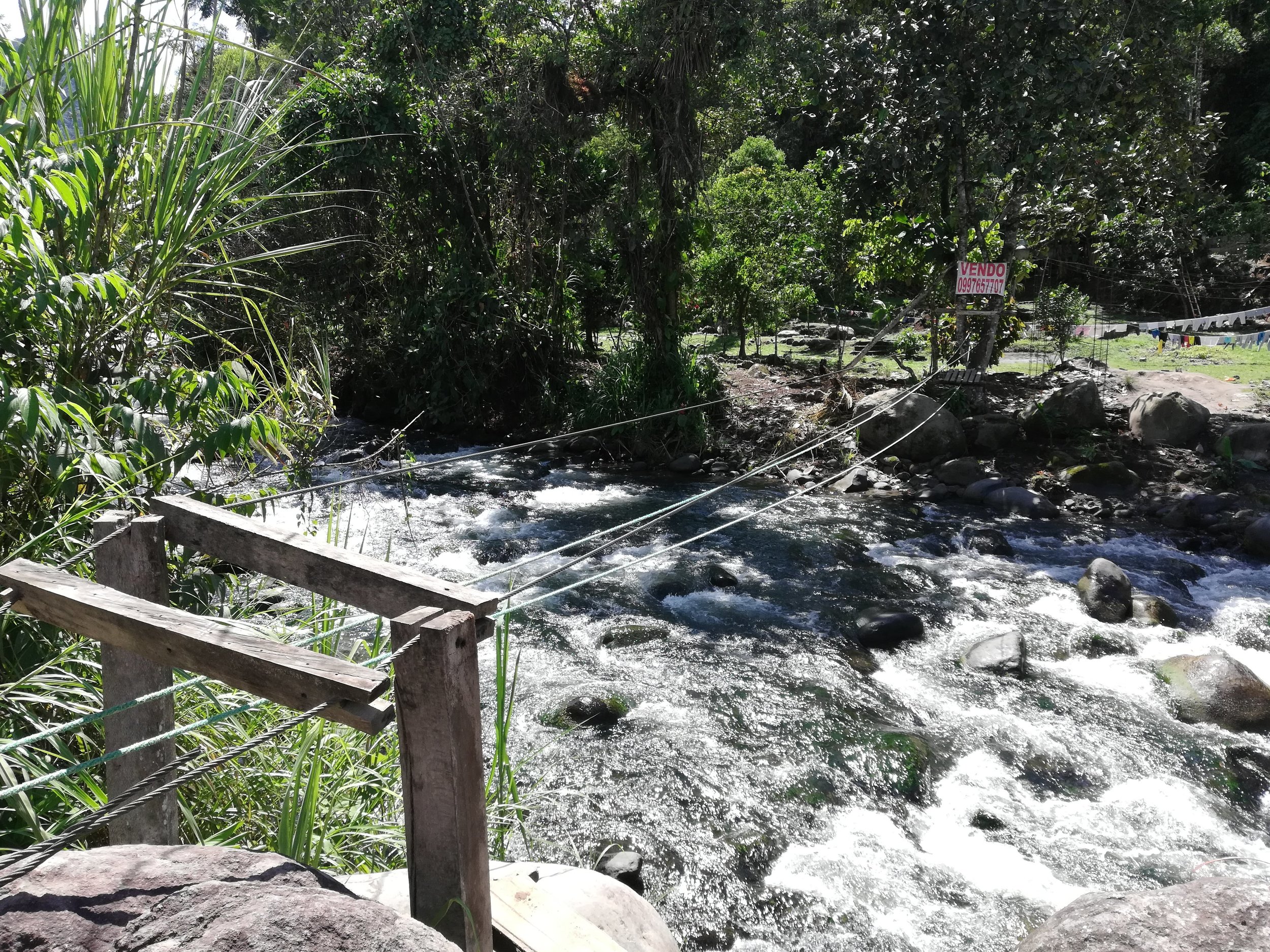




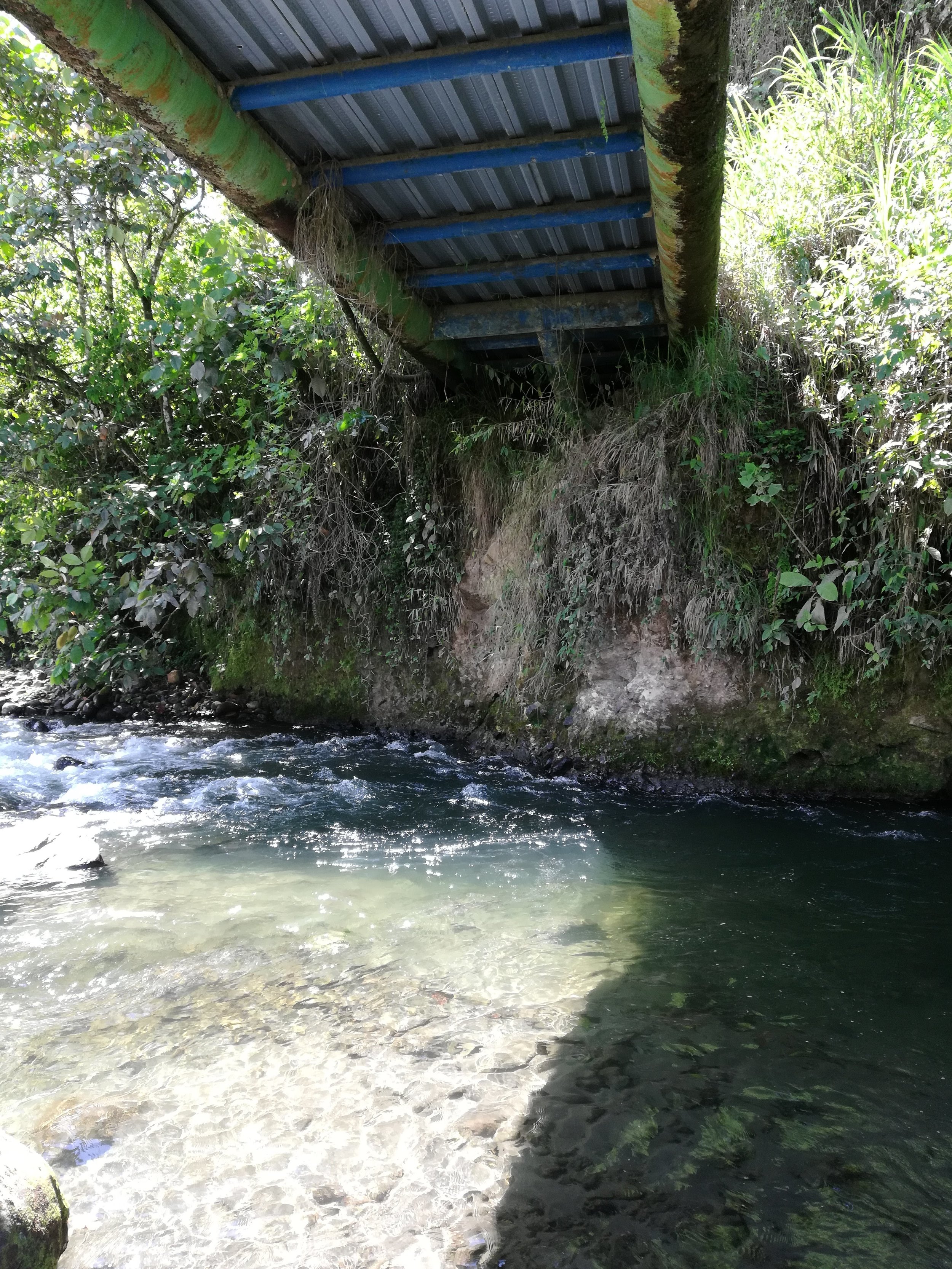

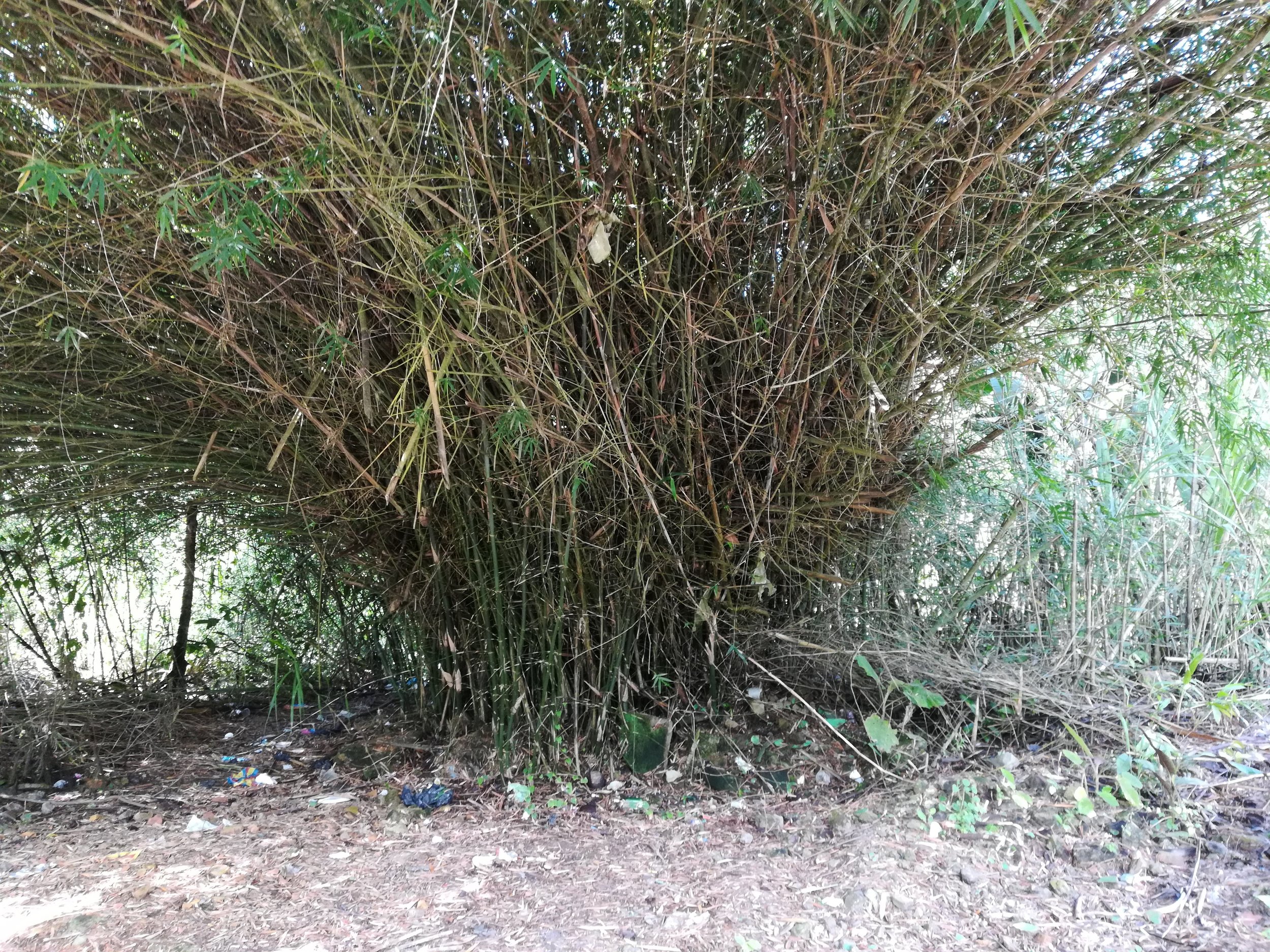

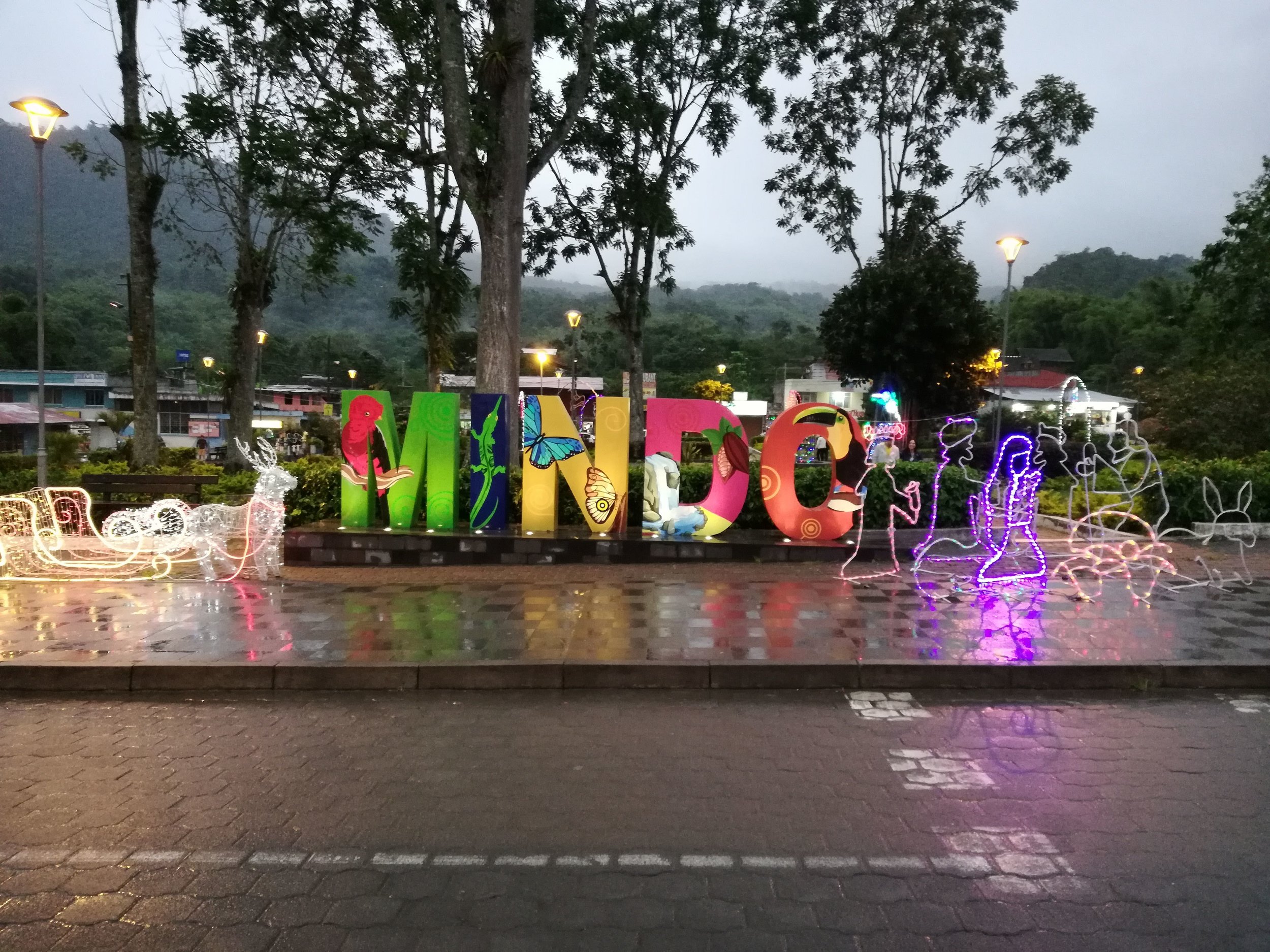
My Health
Each time I come to Ecuador, after about 10-15 days, I get some physical reaction. Typically it's digestive problems, but also some throat or respiratory problems and general malaise. It lasts about 3 weeks to a month or so, so when the Christmas Novena comes around, I am just starting to feel good again. But it slows me down for all the preparation and run-up. This year, I was exercising regularly until the sickness arrive in mid-November. I haven't gotten back on the exercise train yet, as I've either been too busy or traveling, but I aim to get back into things once I get a good opportunity.
I cook breakfast every morning myself when I'm in Chontal. I have a propane range-top in the kitchen, and I make eggs. I have an electric kettle for heating water, so I have coffee as well, to go with bread and often peanut butter. When I get fruits like bananas, I include them for breakfast too. For lunch, I eat either at one of the local families' homes or at the restaurants in the village - which are basically people's kitchens opened up. There are now about 4 places to stop by and get a meal, and I try to get to them all and spread out. I'll generally get to one of them for dinner too, or one certain evenings eat at people's homes.
Since soccer and 3-on-3 volleyball are the only sports played in Chontal, I miss basketball and other US sports. In Puerto Quito, which was a much bigger place, there was a good amount of opportunity to play basketball, but here there's none, so that's been tough.
There are also the mosquito bites and a bug sting every now and then that you get accustomed to. But other than that, my health has been excellent.
New Year’s Eve
As New Year’s Eve rolled around, the pueblo got ready by having a soccer tournament in the daytime. Homes also prepared for their parties by making their monigotes for the contest and subsequent burning at midnight. I went around and got a few photos:
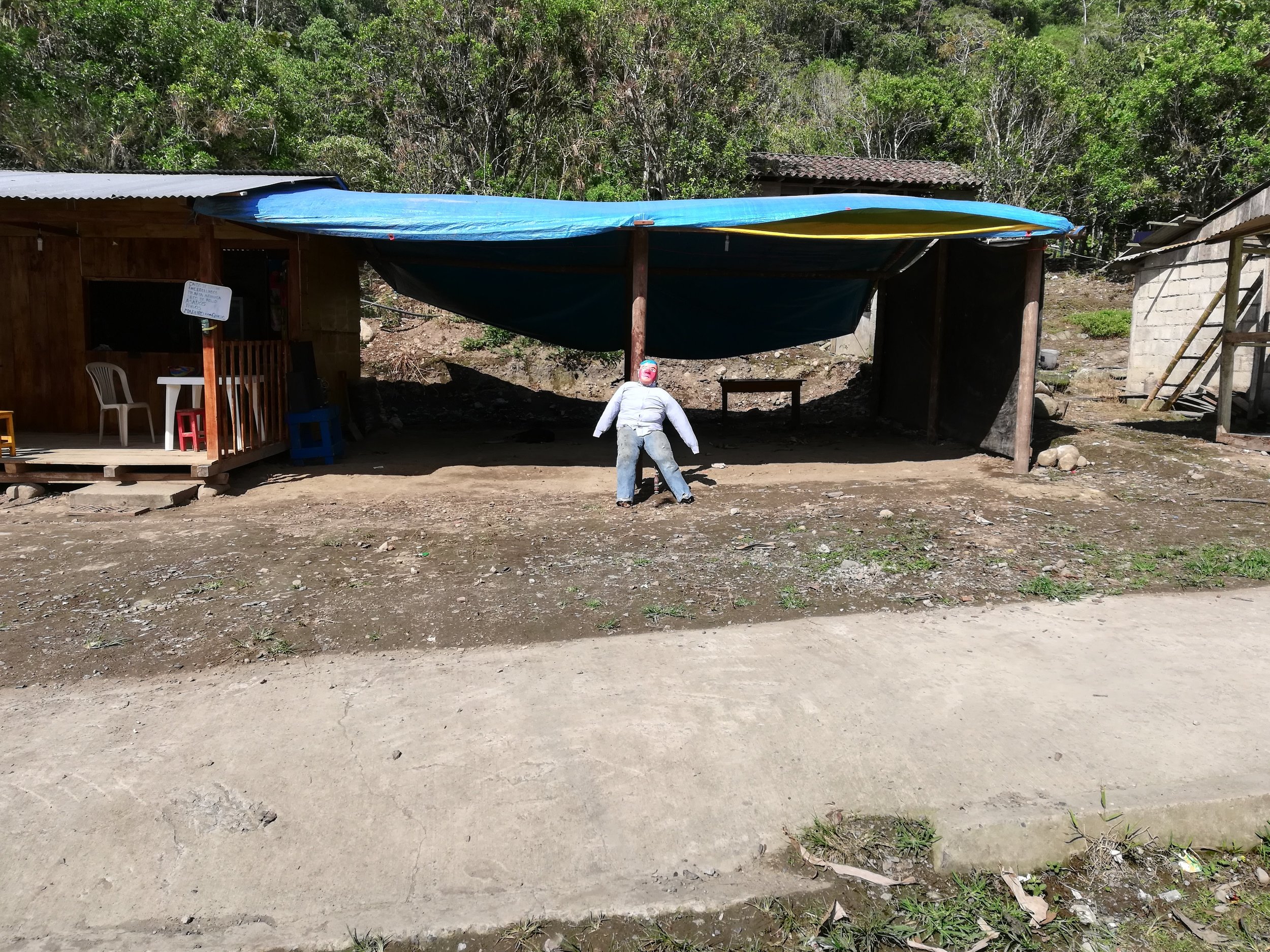
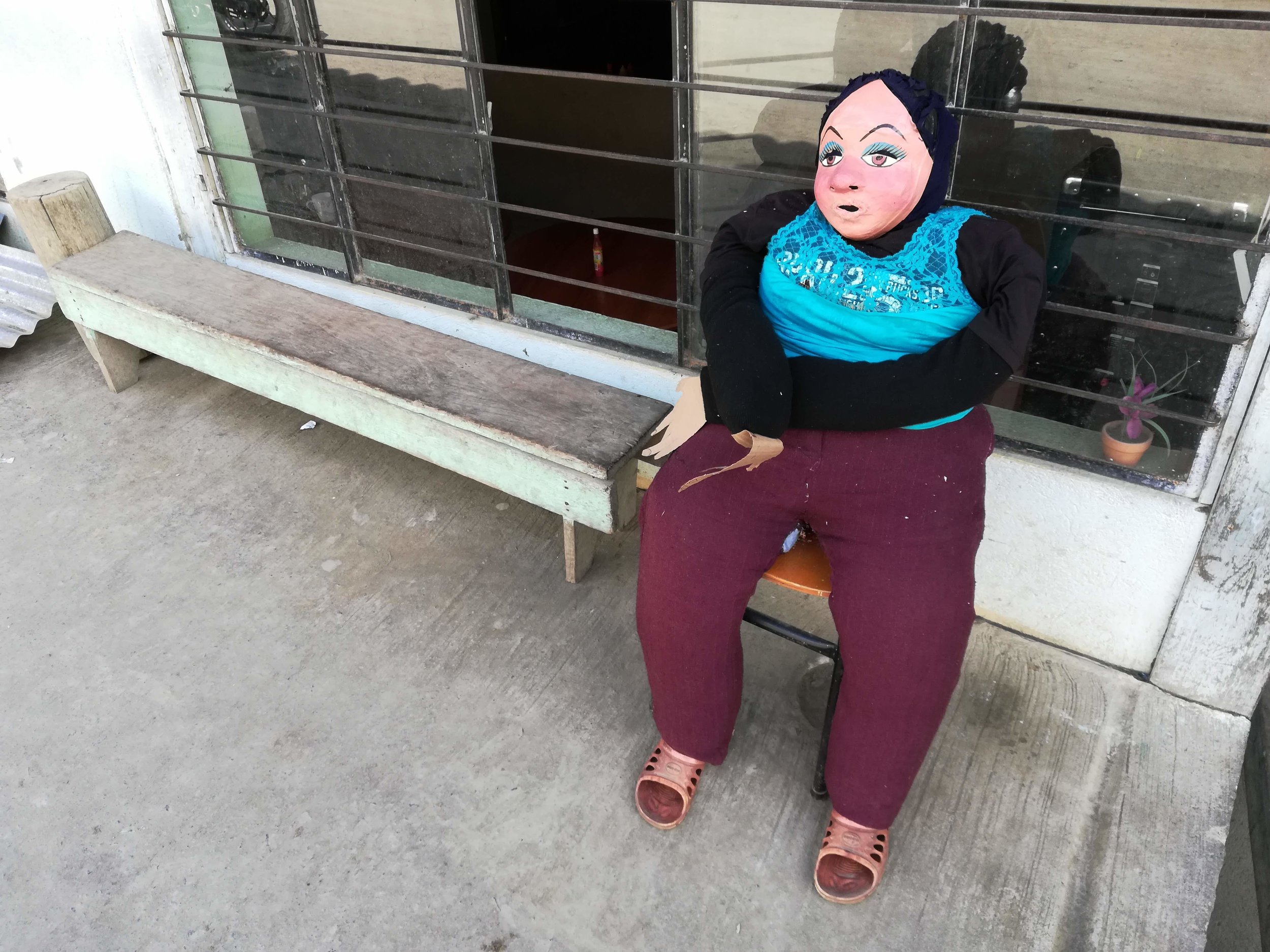
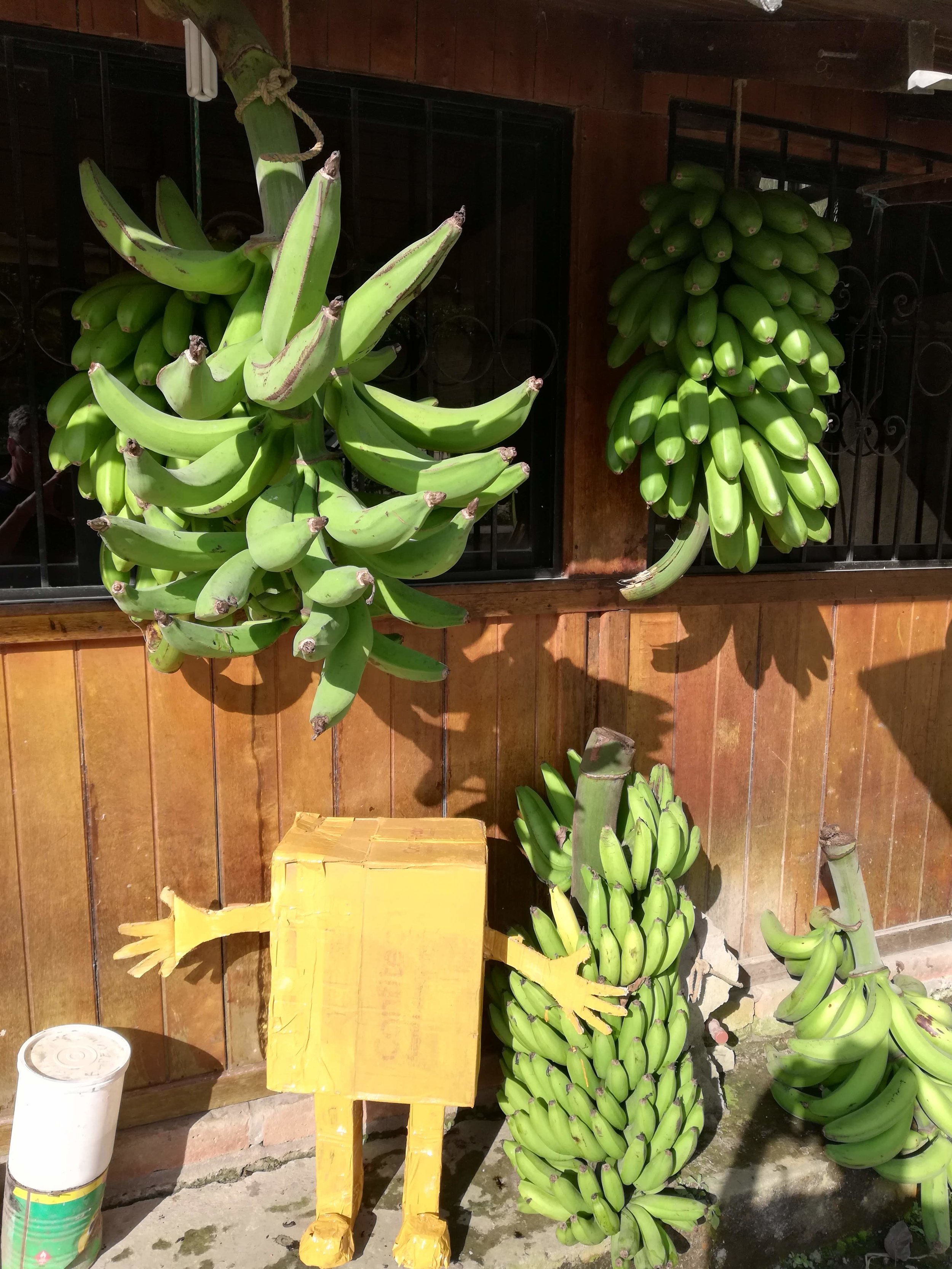
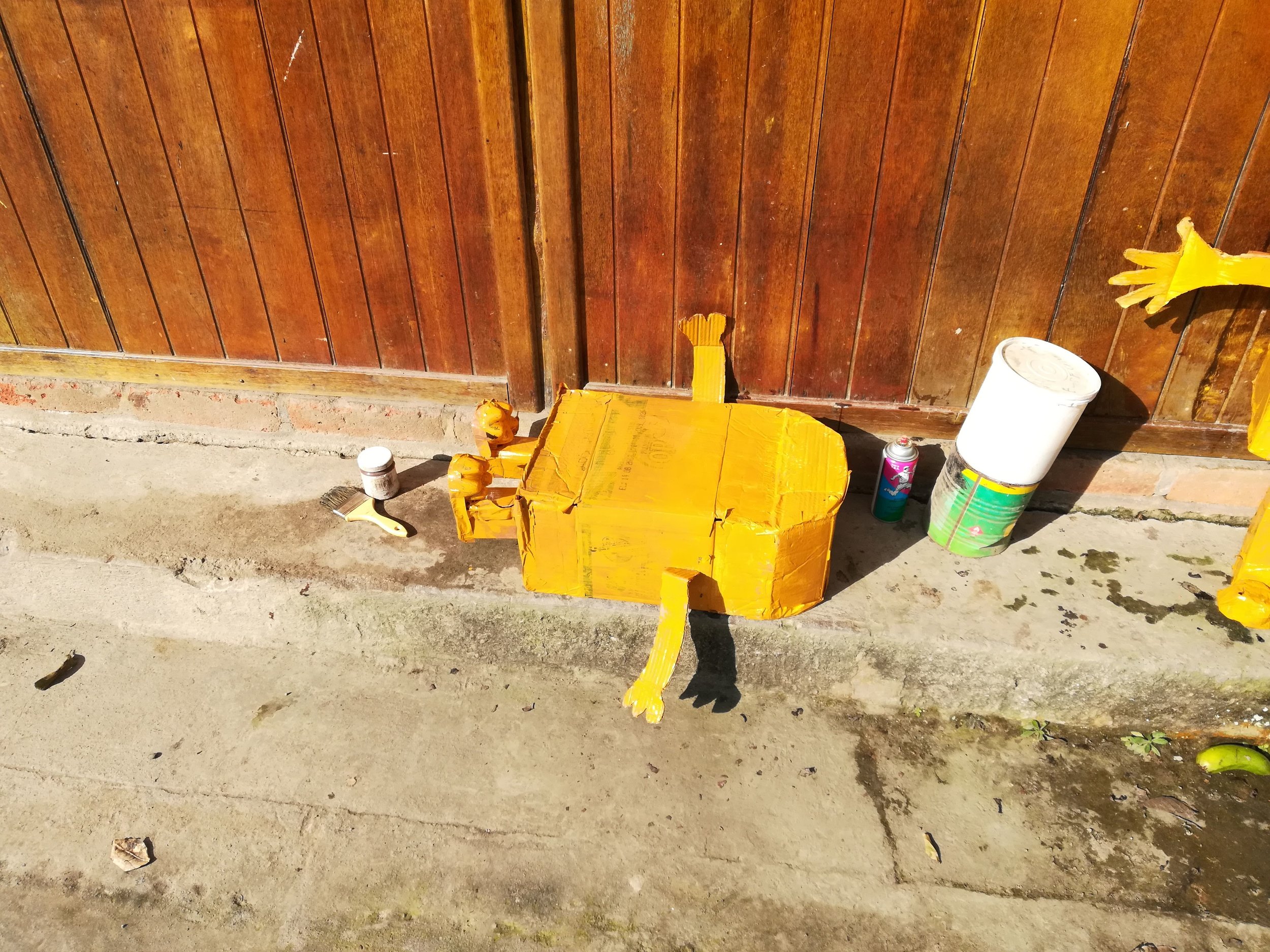
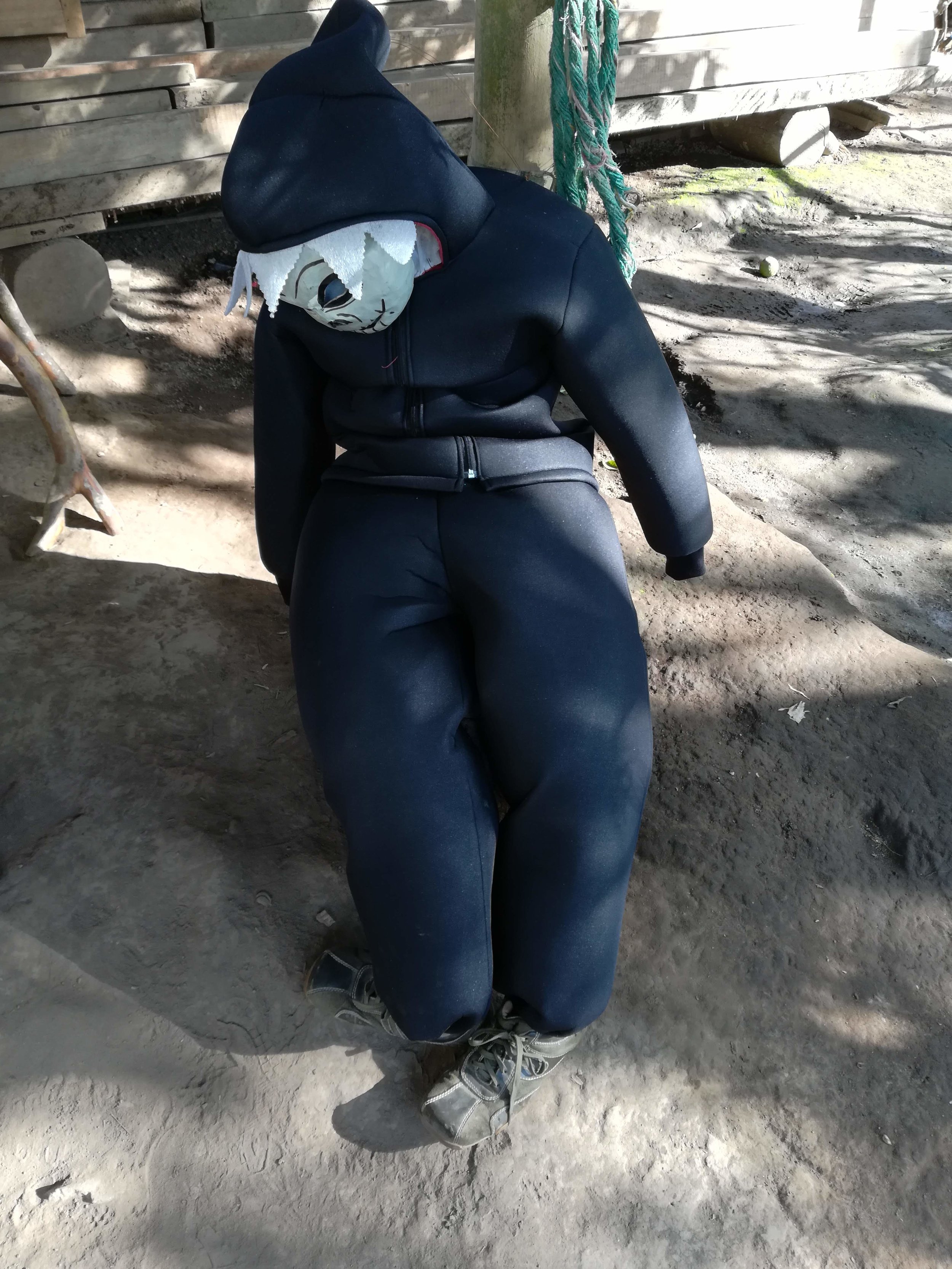
The last few years that I’ve been here, the church made its own monigote: the scape goat. A little goat, the aim was to bring the monigote idea into a Christian understanding. The scape goat was the goat on which the Hebrew high priest symbolically placed all the sins of the people of Israel, in the ceremony of Yom Kippur, the New Year. The scape goat was then led outside of the city to never be fond again. In the Christian understanding, Jesus crucified on the cross fulfills that role of the scape goat, once and for all. So, as a symbol of Jesus, I and Ines have made a scape goat as the church monigote for the past fews years. People come to the Mass and write on pieces of paper the negative things that they’ve done or been affected by the past year, and place them inside the goat through a hole on its back. Then, we burn the scape goat after or before the Mass. Everyone who comes, wants to participate. (I’ve always wanted to incorporate it into the penitential rite at the beginning of the New Year’s Eve Mass.) Again, it takes the popular tradition of the burning the old year in effigy through the monigote, and brings it into the Christian mystery of salvation.
Anyway, no one was around to help make the scape goat, so I went around the pueblo getting parts together and made one myself. The priest had been in town the day before, and said he might make it for Mass, he might not. But that if he can’t make it, that I should have a service of the Word and Communion (without discussing it with me first). So, as the start time approached, the priest was nowhere to be found - but I was prepared with a reflection and the scape goat.
Well, I rang the bells for the first time, then 15 minutes later for the second time. And no one came, not a single person. By the start time, there was still no one there. It was depressing. So, I decided I’d stay a while by myself, and I closed the doors of the church. Once the doors were closed, the DJ music in the pueblo piped up, and the fiesta was on.
While I was there, a family came by with their visitors to recite their prayers (they didn’t seem to care that I was already praying there). Through one of the kids, they asked if they could burn the goat with me. But it was already late, and it’s really something for the faith community to do together - the context was past. Then, through another child, they asked if they could bring it to the big monigote burning at midnight. No, I said, I’ll think of something to do with it. So they left. I wasn’t sure what to do with it, but after leaving the church, I decided I would fill out my own piece of paper on my own behalf and that of the people, and burn the goat then myself. So, that’s what I did.
I wasn’t in the mood to party with the people after that (and wasn’t all that up for partying anyway), so I spent the evening inside, with a movie and music and just relaxing a bit. I actually enjoyed it a lot, and I felt close to God. Now I’m not putting blame on anyone in particular. It was just a bad overall situation to be in, and I got left holding the ball, so to speak. But it also made me feel all the more that it was time for me to move on. From being the scapegoat!
Visit to Puerto Quito and the Franciscan Sisters
After New Year’s, I had some time to go to Puerto Quito and visit the Franciscan Missionaries of St. Joseph, friends for some time now. It was great to catch up!
I also got to catch up with a few local friends there in the pueblo, and was able to join in with some of the sisters’ activities and greet more people I haven’t seen in a few years.
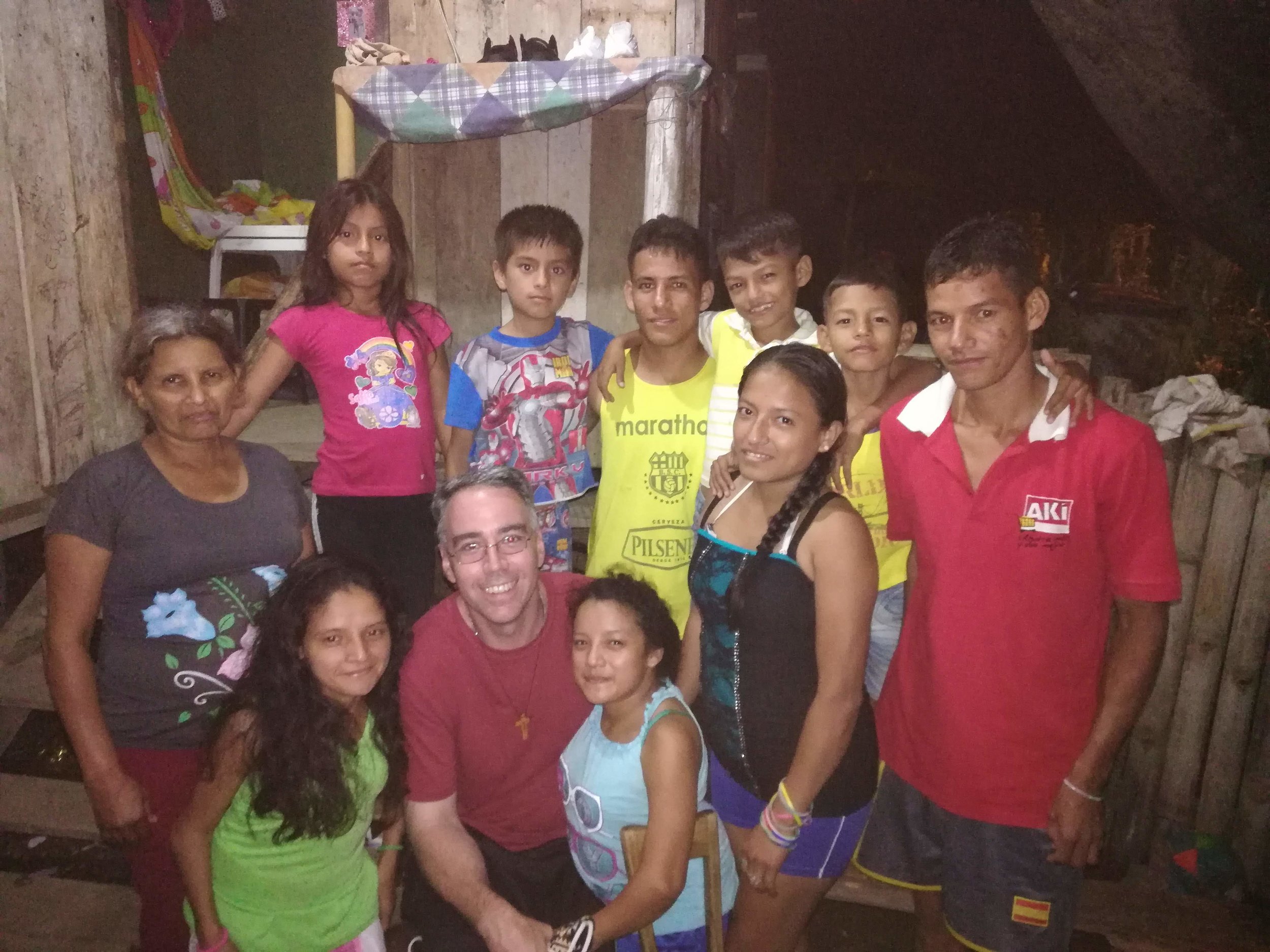
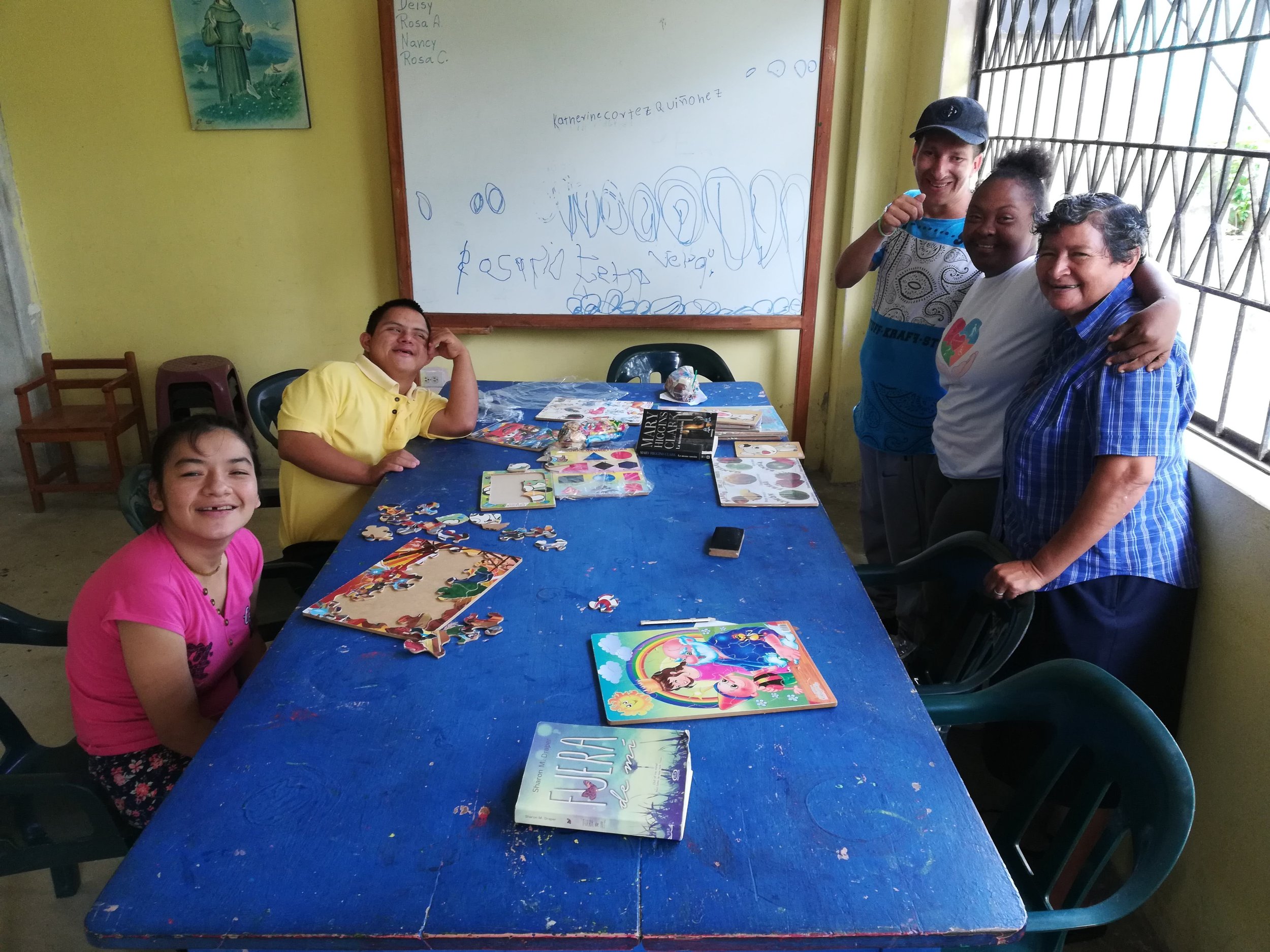
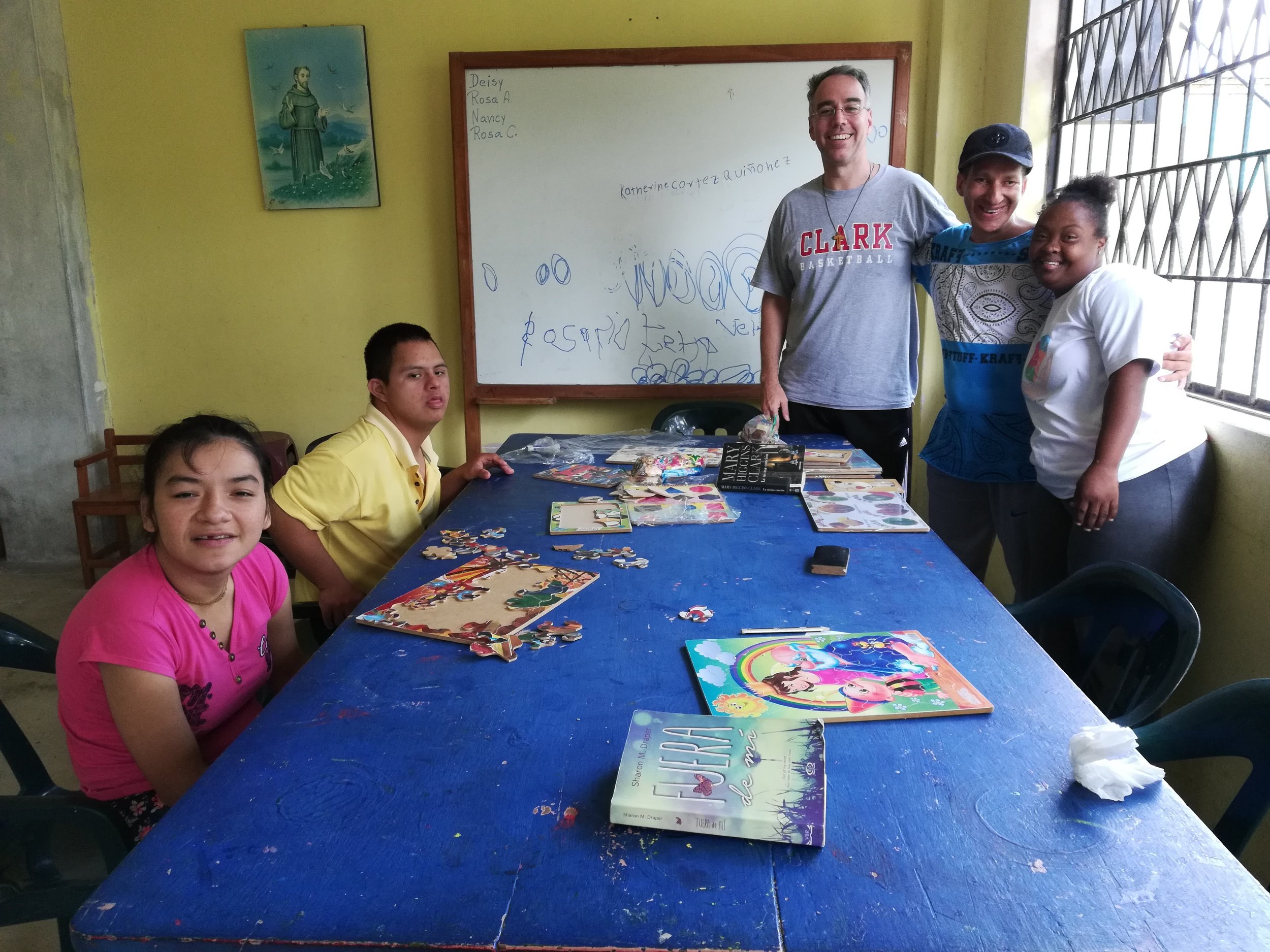

Other Challenges
I’ve not been welcomed to enter the school, and the reason, I’ve found out, stems from the experience a few years in trying to establish the exchange between a school in Bridgewater, MA and the school in Chontal. After finding interest from the various dialogues I had with the pertinent staff in each school, I attempted to set up an online meeting between the primary staff members. The purpose was to have a first face-to-face meeting, to have some dialogue about expectations, possibilities, capabilities, and willingness, and to see what the next steps might be. The coordinator from Chontal canceled on us about 2 hours before the first meeting, with the reason being he had to bring books to another school. Everyone agreed to re-schedule. When that date and time arrived, the coordinator from Chontal never showed up, and then didn’t respond to any of my communications.
I sent a letter to the leader of the parents’ committee in Chontal, detailing the background and what happened, and expressing my disappointment. I thought that the families should know what transpired, as I have a relationship with the families as well as the school. She, in turn, didn’t share the letter with any of the families, and so no one in the pueblo knew about the efforts done to link the schools and how it transpired. But she did share the letter with the coordinator. So, that’s where all that stands.
I should also note that, several years ago, I brought a new video projector to gift to the school at Christmas. In a period of teacher transition about 2 years ago, as a variety of teachers were leaving, the projector disappeared. I was informed several months after it happened, and was told that no one knew about it, neither the local police or anyone in the community - it was kept hidden. So, it’s from these experiences that I learned that it’s not trustworthy to cooperate with the school.
Another story: a few years ago, during the Easter vigil, while the new youth group was being formed and one of the founders of the village in the mountain was passing away, the family that was hosting all the youth that had come from Quito was robbed. It was a shock - the robbers knew the family would be in church. Now, this family is understood in the pueblo to be one of the church leaders. So, anyway, this time while visiting with them, the father of the family confessed to me that police had actually located and identified the thieves. It’s actually someone very close to the family, who lives in the pueblo. BUT … as the man told me, they aren’t saying or doing anything. I thought, “Well, there goes justice.” And if someone else is robbed, who will be responsible? It calls to mind the sex abuse crisis in the church, among other effects of the “code of silence”. But the obvious point is this: there must be a lot to keep hidden.
This keeping things in the dark is the fundamental undercurrent here in all parts of Chontal. In part, because Chontal is one large family - most everyone is related in some form or another. There is something like that in probably all small village dynamics: there is a lot to hide. Shame - and keeping things unspoken and hidden - is the biggest enemy to life and society here, not poverty itself. Now, anyone who knows me might be smiling a bit right now: that’s pretty much the opposite of me. Which is why I make some of the adults here nervous!
What I do
There once was a company that had a factory pushing out a million products a day. One day, one of the primary machines just suddenly stopped: something was broken. At a million a day, they got in contact right away with the best engineering consult they could find, to resolve the problem. So the engineer came that very day.
He arrived and was welcomed into the company and introduced the factory floor and the machine that had stopped working. Without saying anything, he began to inspect the machine, first looking at it from a distance, then the very front of it, close up. He looked at it from the top (as best he could!), and then scooted down onto his back to get a peek near the rear section. After about an hour of doing this, and the company staff watching in puzzlement, he stopped, took a thick marker out of his pocket, removed the cap, and, reaching a bit into the depth of the machine, placed a large X-mark on one particular part. He stood back, replaced the marker, and said to the manager, “Replace this one part, and that will resolve the problem.” While the engineer left, the staff hurried to replace the part. When they finally did, they fired up the machine, and, lo and behold, it worked again! A million a day was back on track.
A week later, the company received a bill in the mail from the engineer. When the manager saw the bill, his jaw dropped: $10,101. Upset, he wrote back asking for a itemization. The engineer replied back: One hour of labor: $100. One marker to make an important X mark: $1. Knowing where to put it: $10,000.
You know, that is like the story of the Judges in the Bible. That is what the judges do, from Deborah to Gideon to Samson and all the others: Israel has a problem, and they come in and touch on the sweet spot that fixes everything. And then they’re done.
That is kind of what I do. At the beginning I talked about tutoring, and how mission is like that for me. That is what I basically do: God sends me to come in and touch the sweet spot that fixes the situation - and then I go. My whole coming to Chontal, everything I’ve done here, is one big action of that. The way I’ve approached people, the things I do day in and day out, my socializing, my time focusing on kids, the reflections I’ve preached, the groups I’ve initiated, the activities, everything - everything - is that. God sent Chontal a consulting engineer to put an X mark on what was broken. Now, whether people want to receive it or not, that I can't control. But that’s what I do. And I’m glad to do it.
“The Spirit of the Lord is upon me,
because he has anointed me
to bring glad tidings to the poor.
He has sent me to proclaim liberty to captives
and recovery of sight to the blind,
to let the oppressed go free,
and to proclaim a year acceptable to the Lord.”
Animals and Nature
A few more photos of animals and landscapes here.
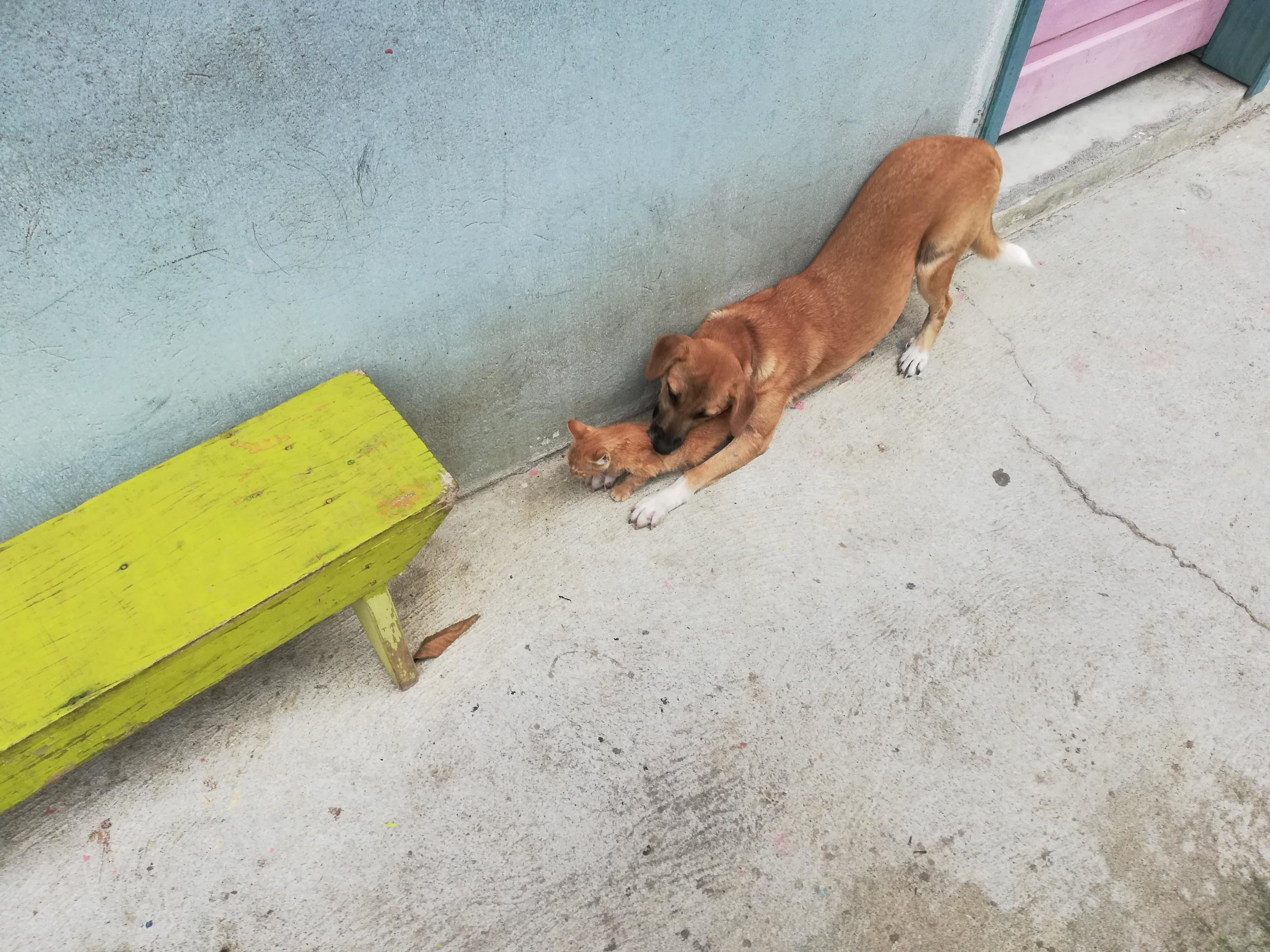

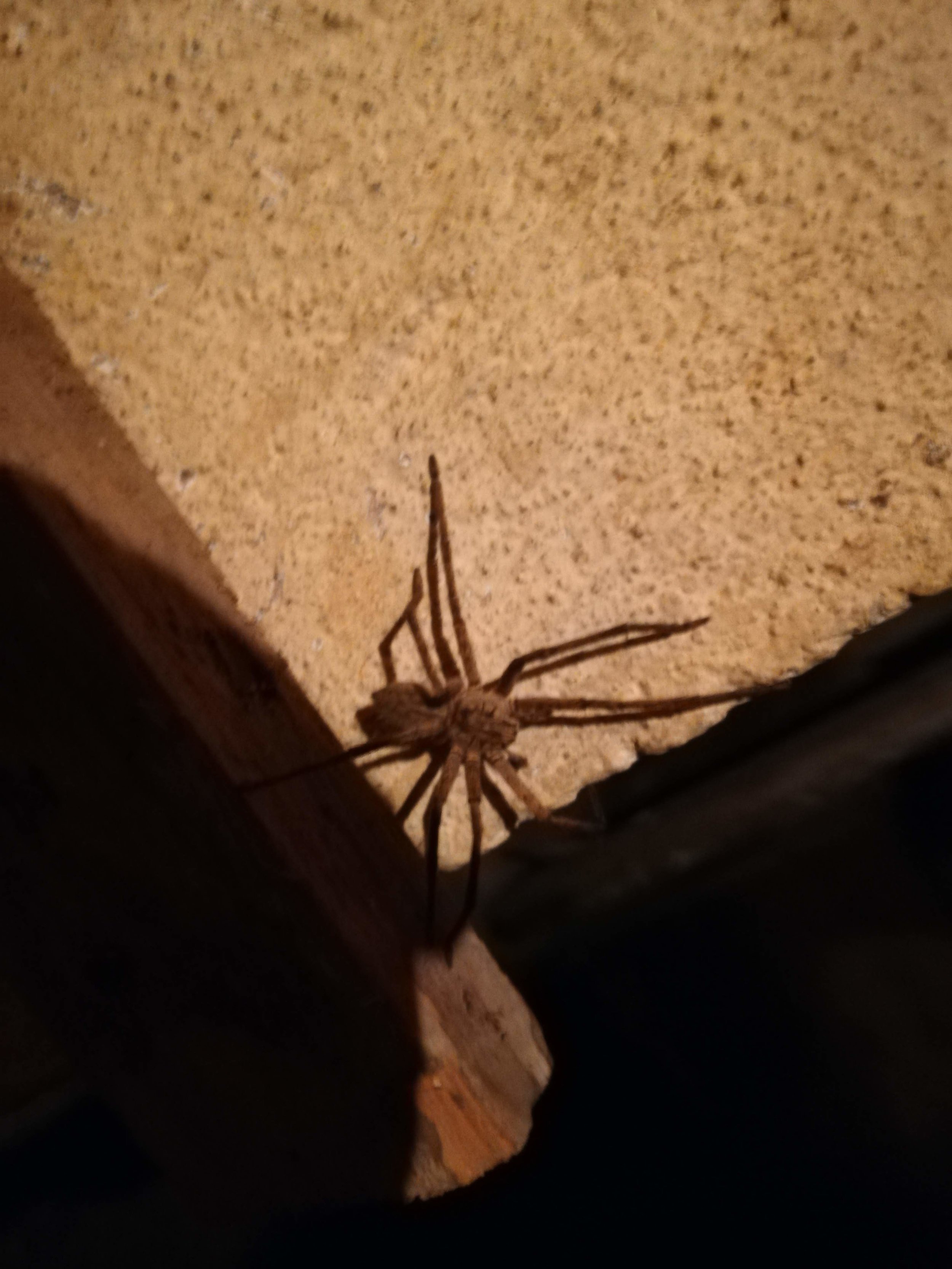
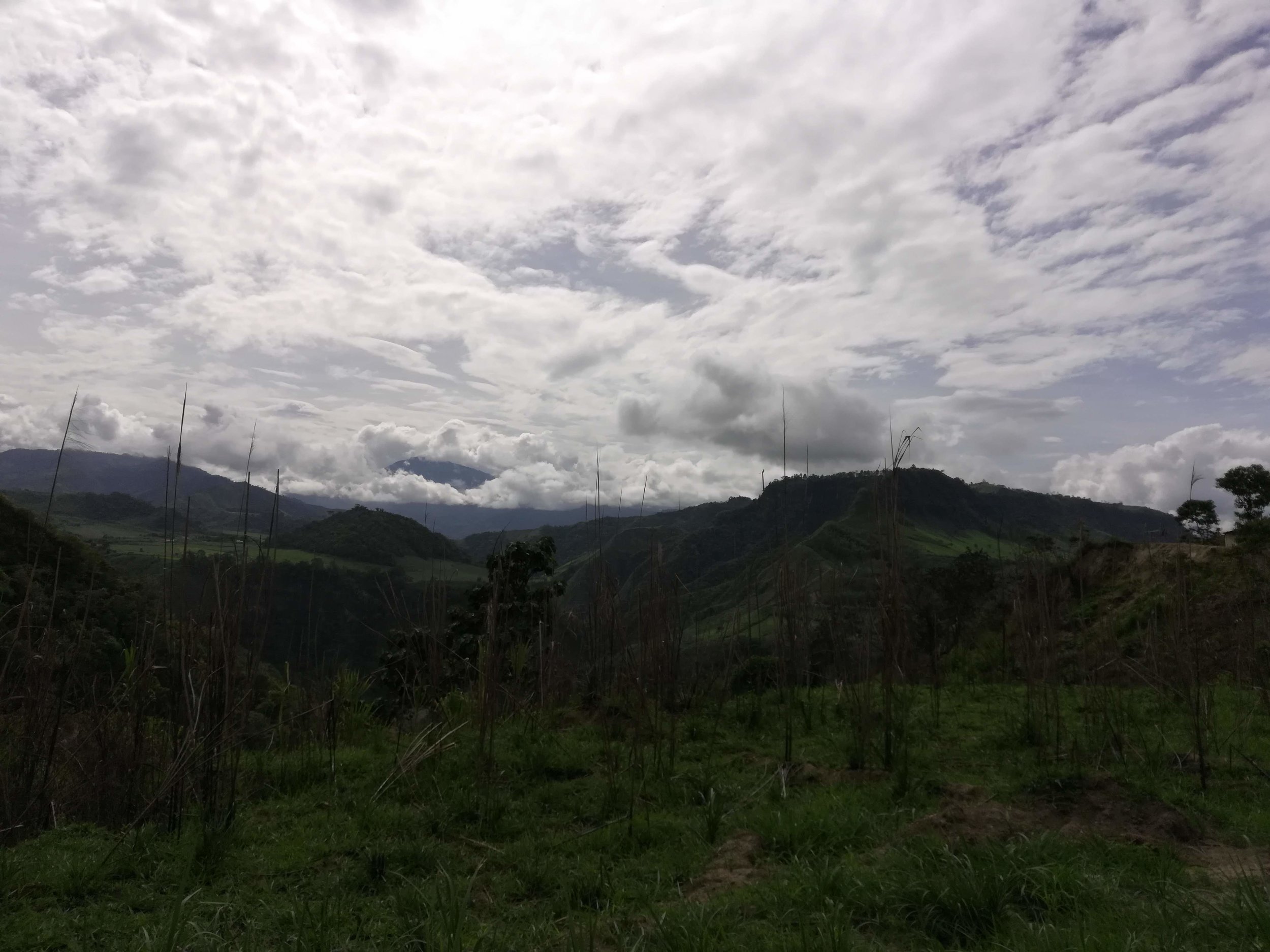

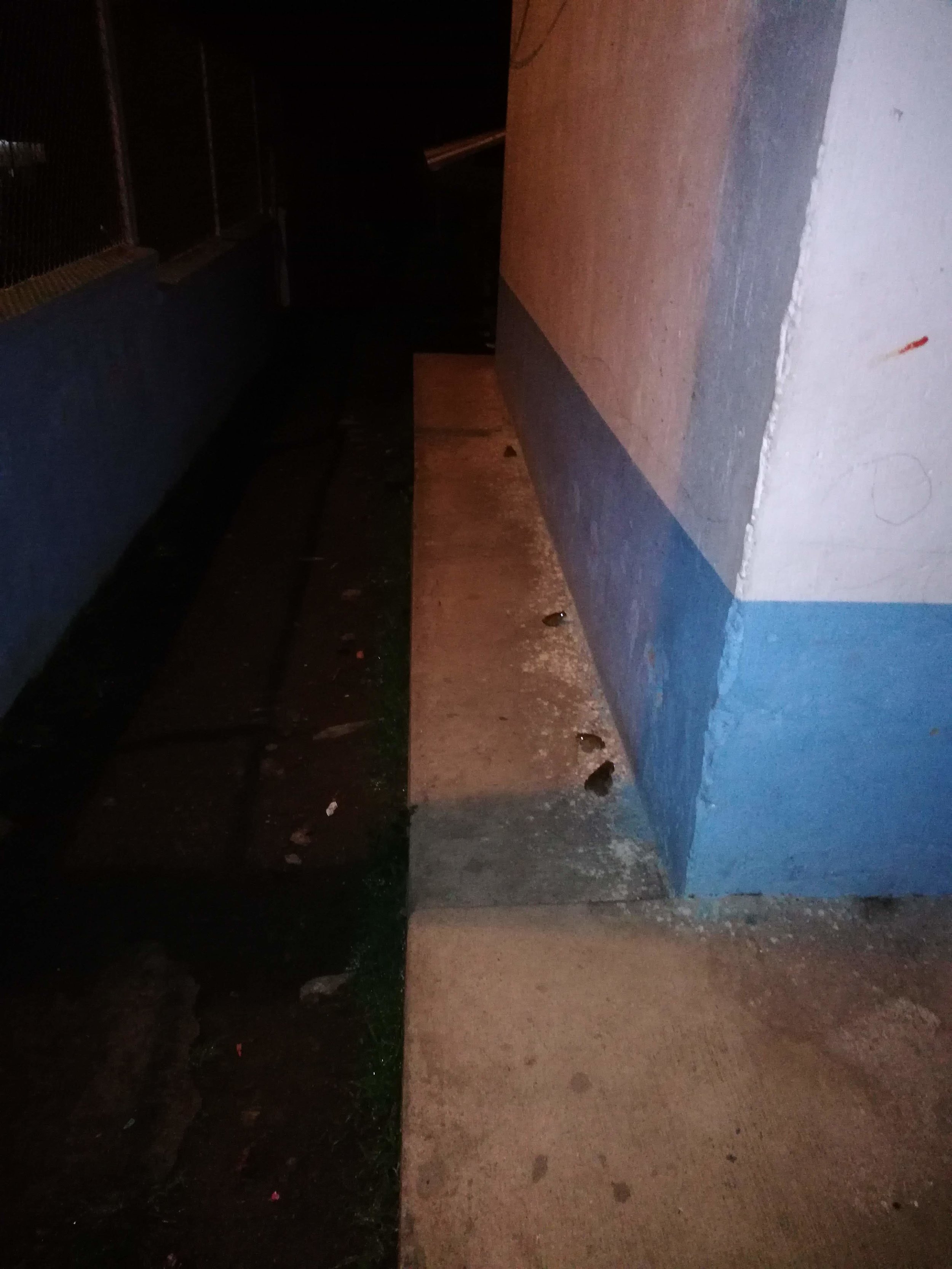



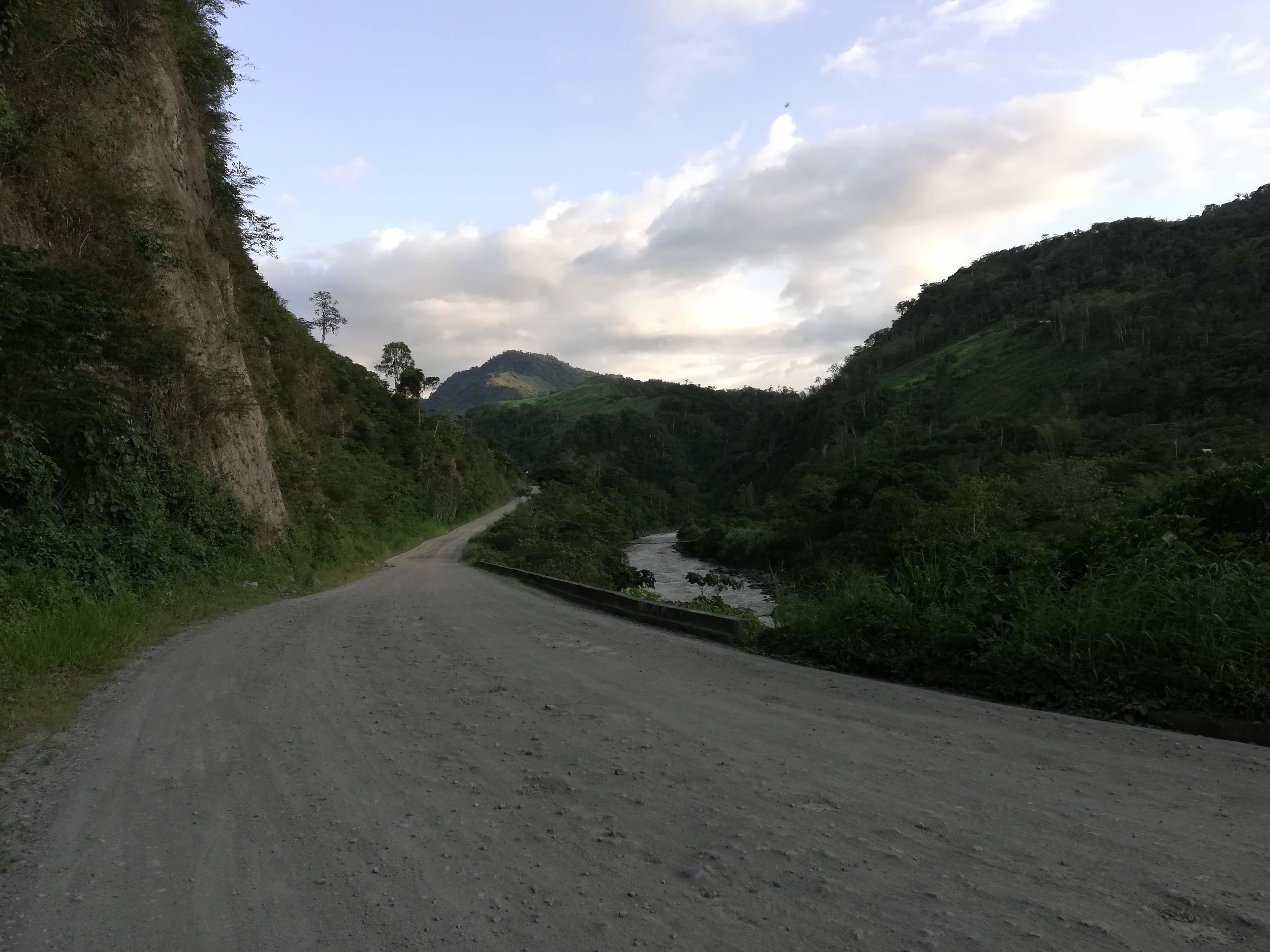
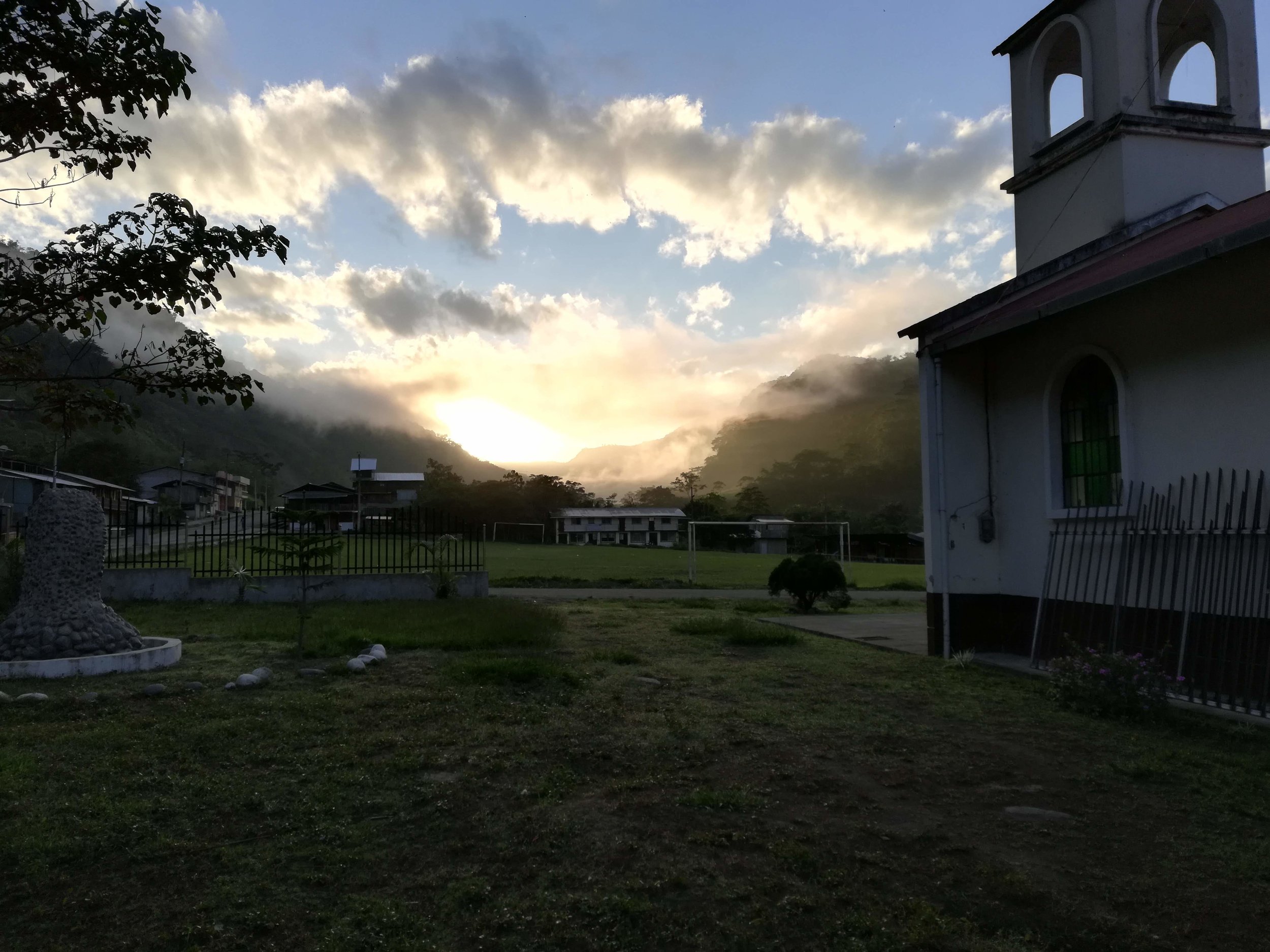
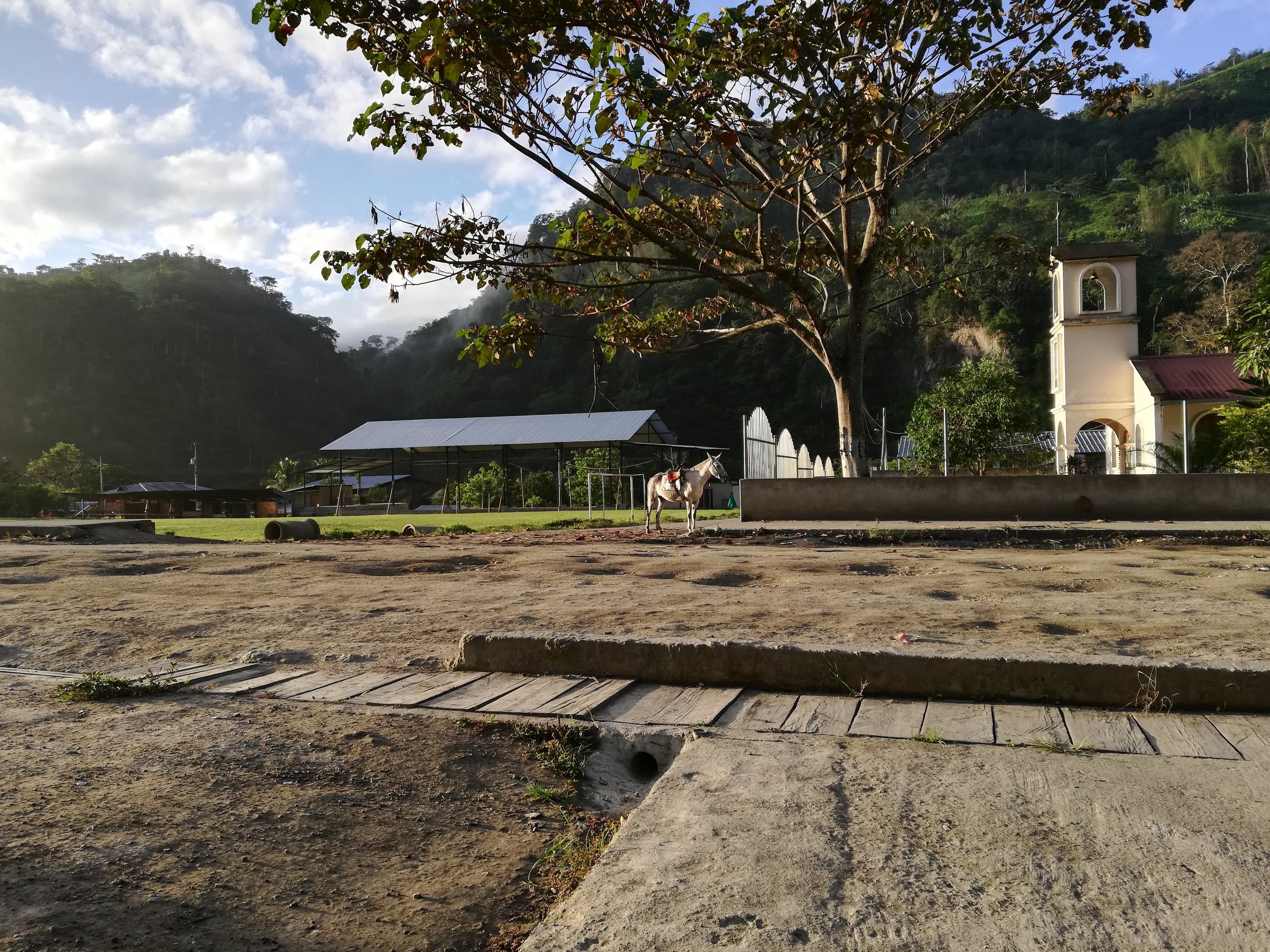
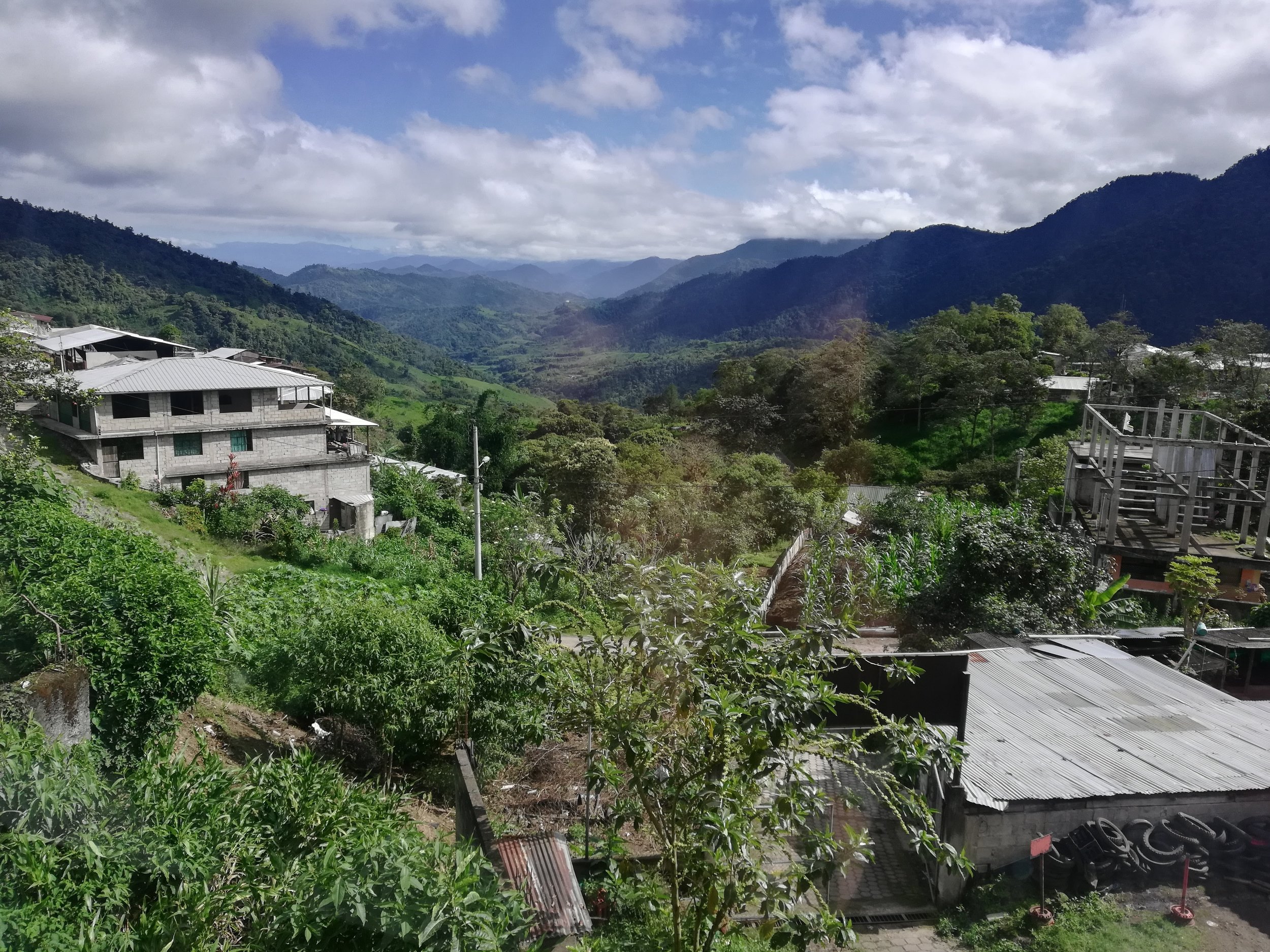
To Peru and the St. James Society
I’m in Mindo now writing all of this, and shortly I go to Quito to see if the visa process completes. When that’s all done, I post on the final costs and balance sheet for the fundraiser that helped me with it. On the 13th of January, I fly to Lima to join up with the St. James Society at their annual meeting. I’ll be in touch along the way as usual.
Please keep me in prayer, and feel free to drop a note at any time.
Have a happy and blessed New Year!
Jerome









